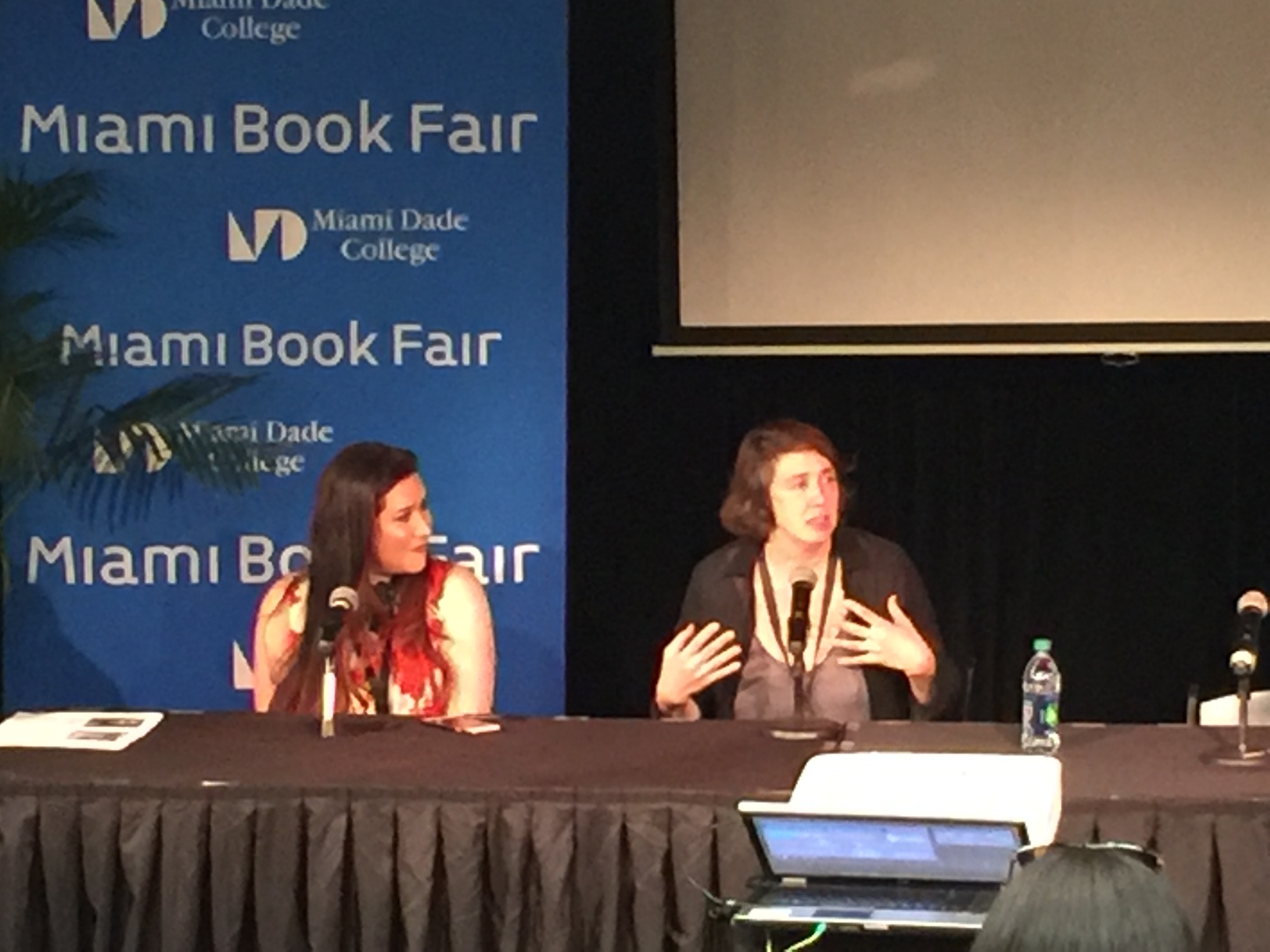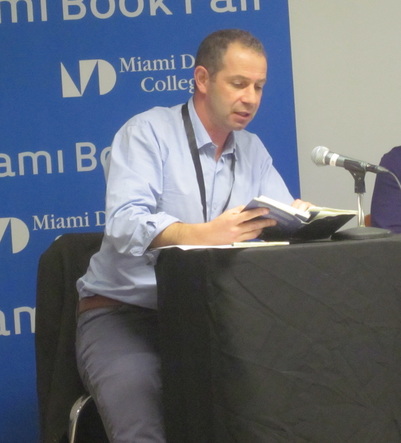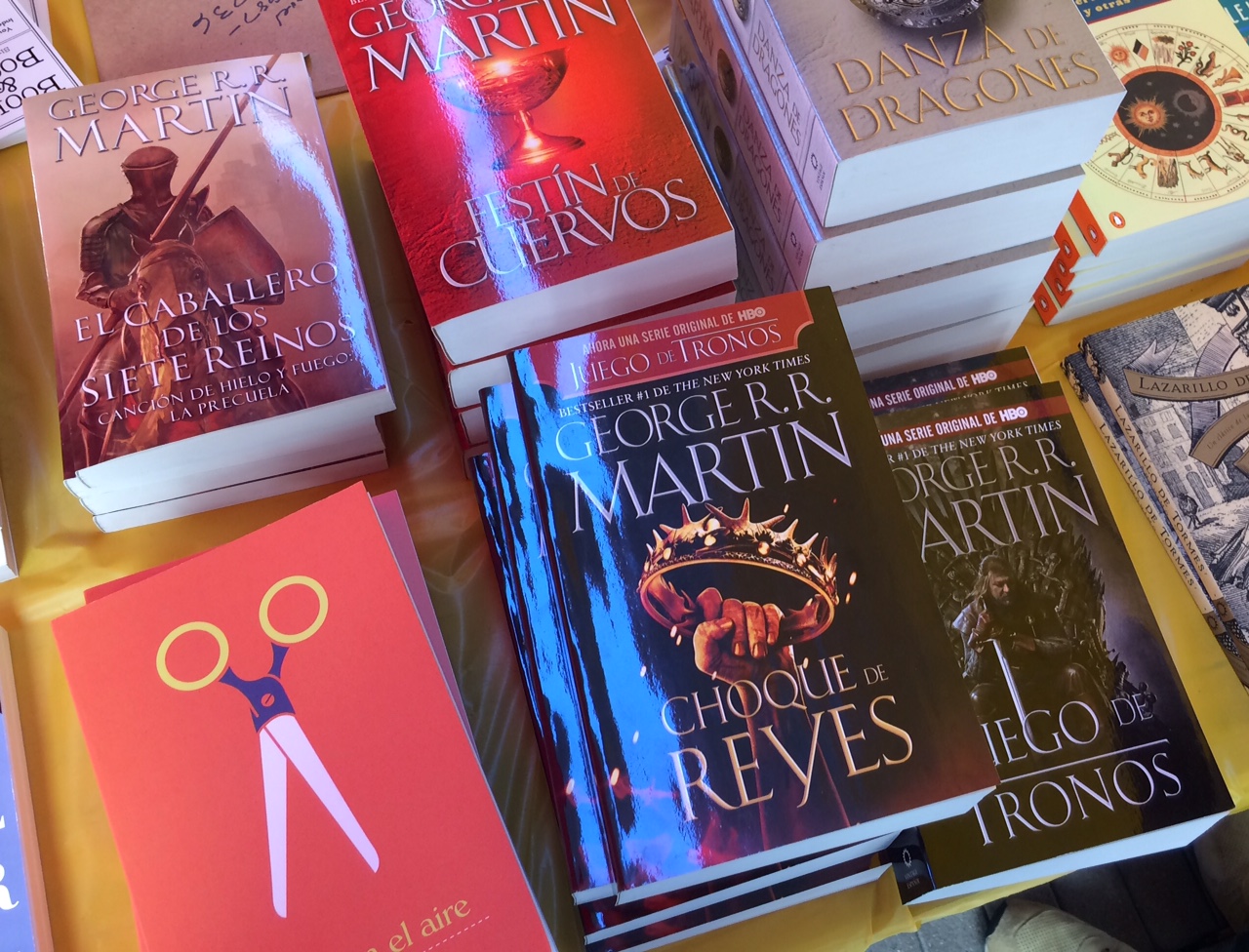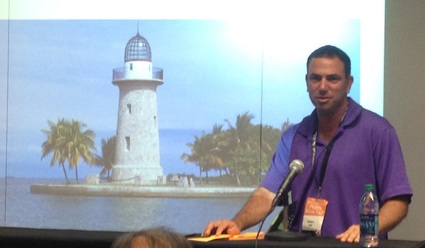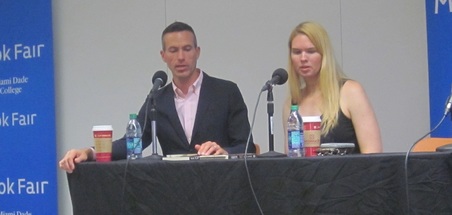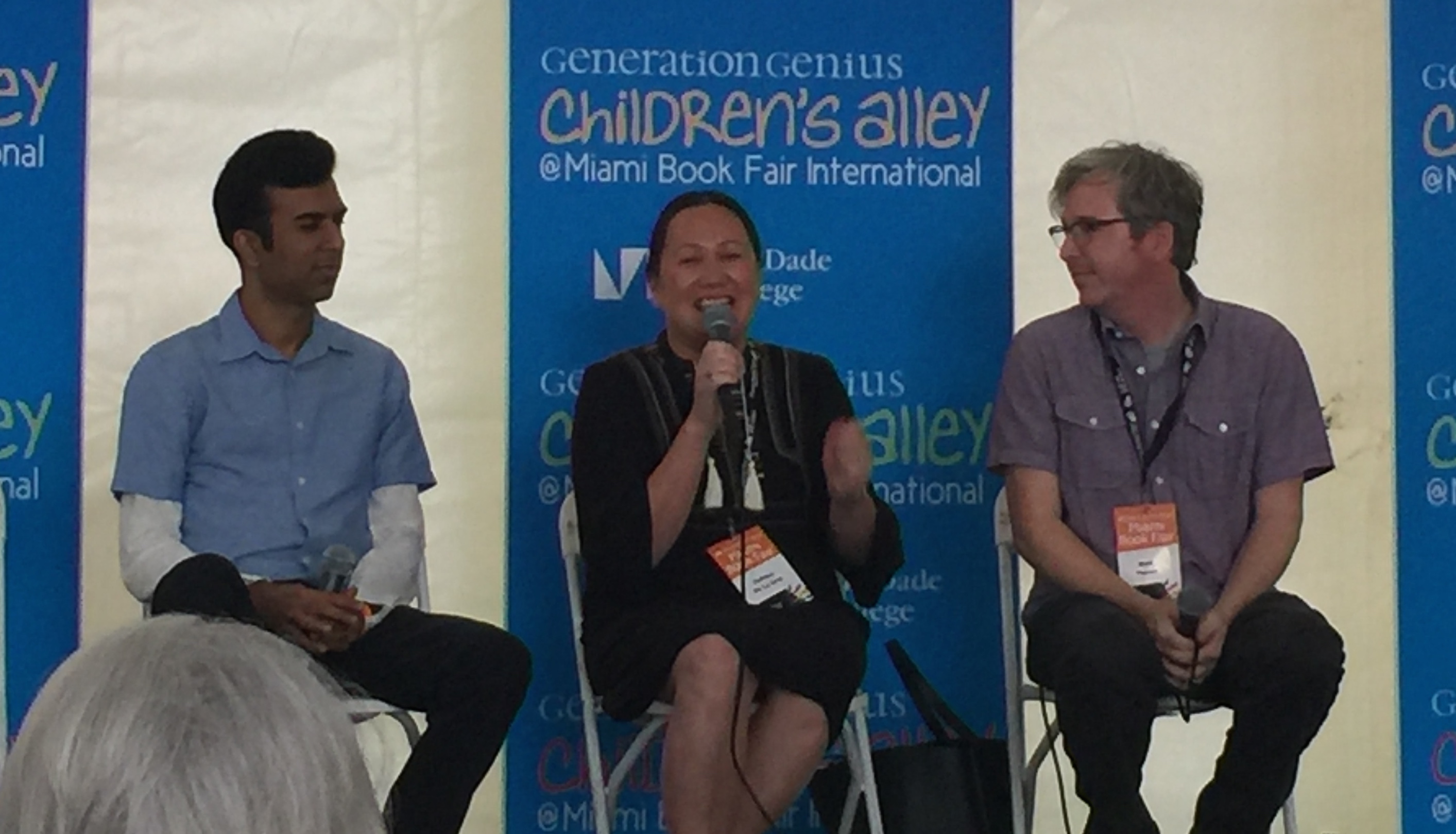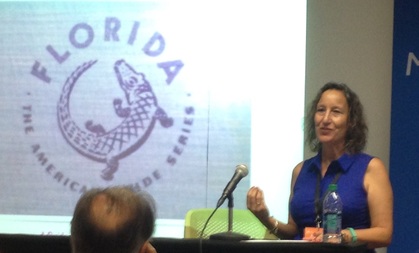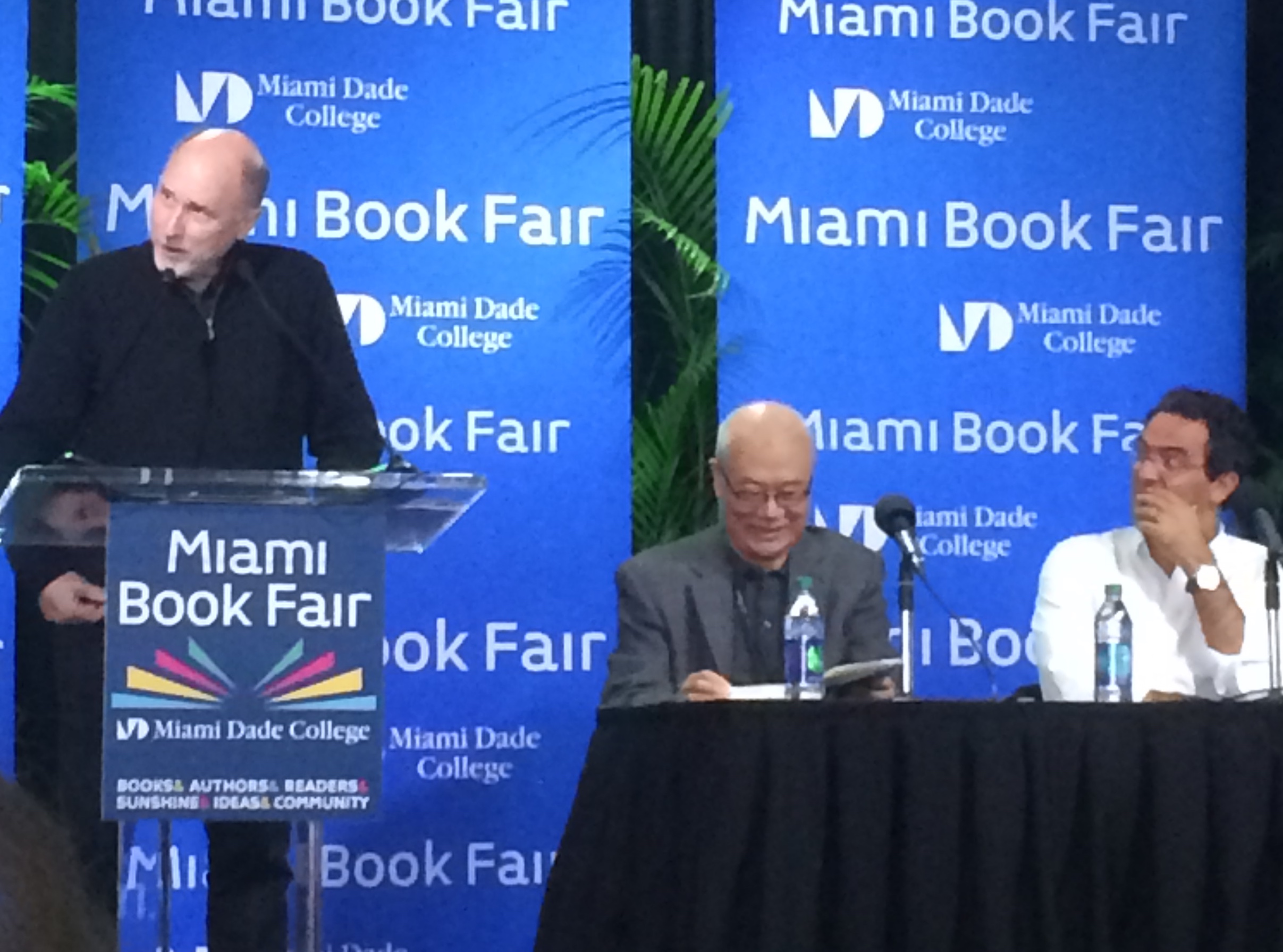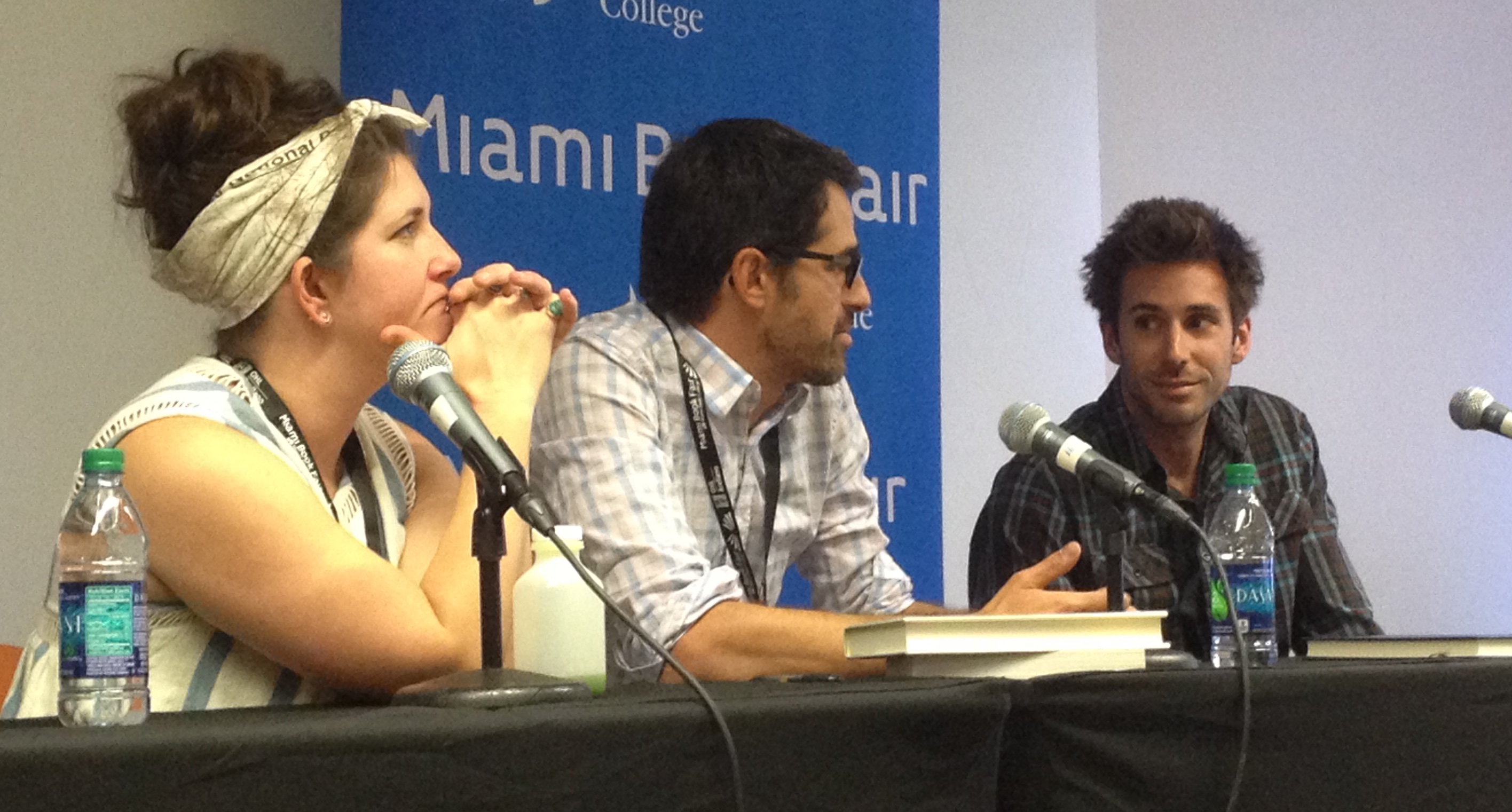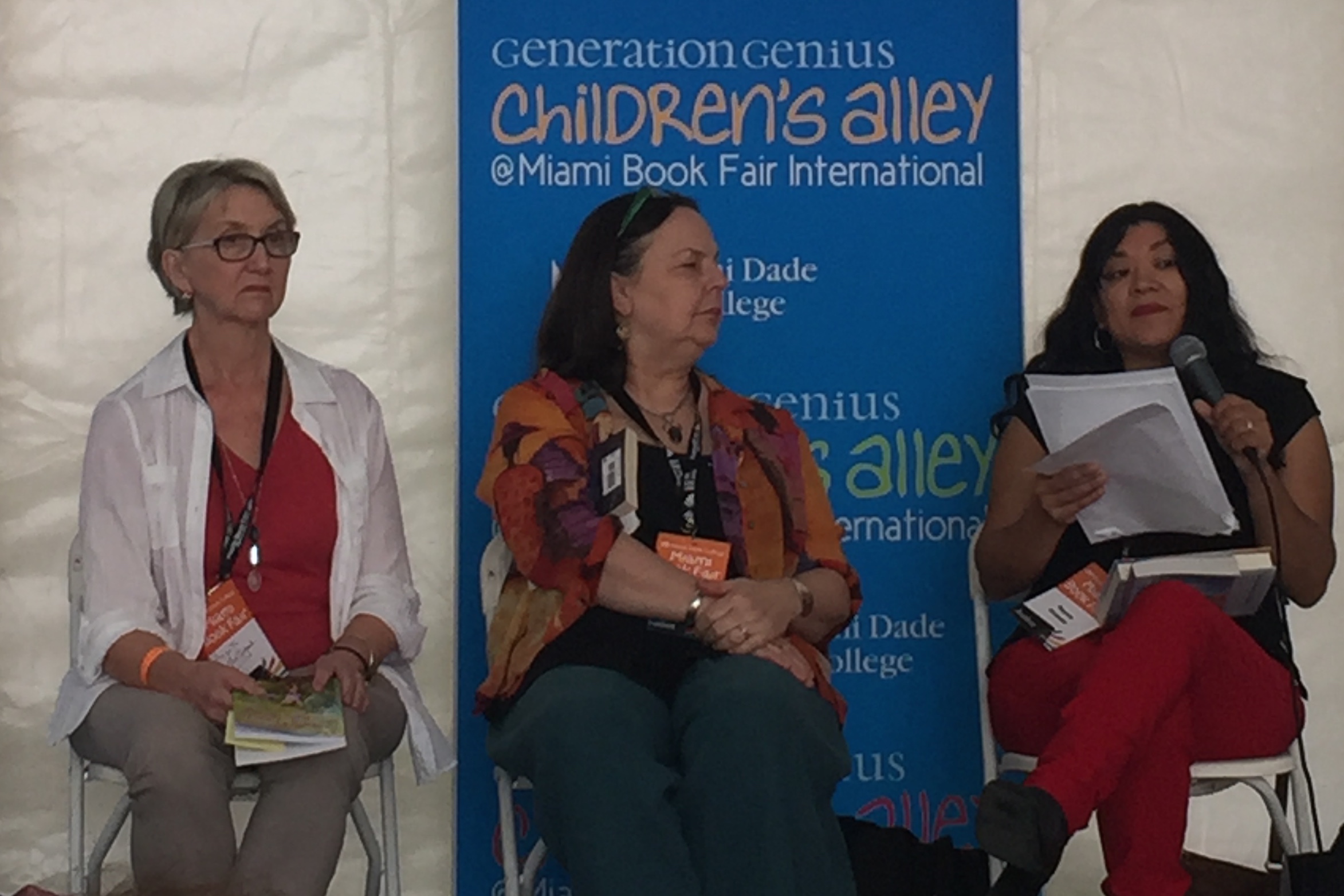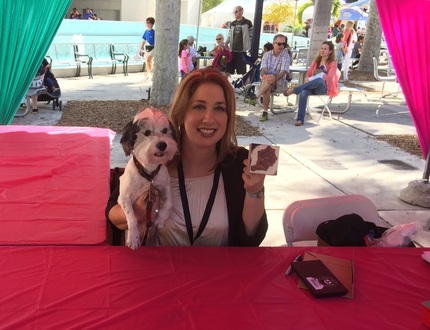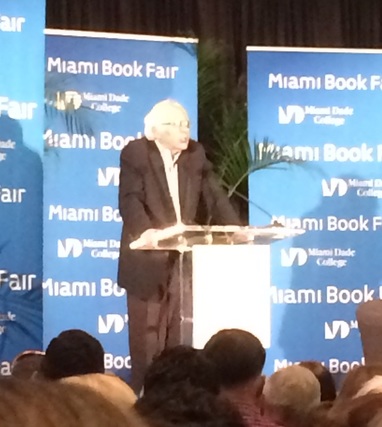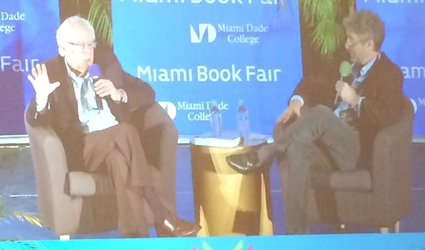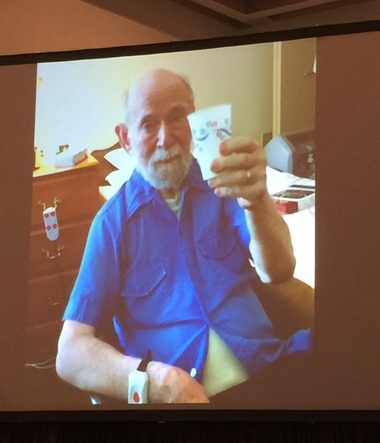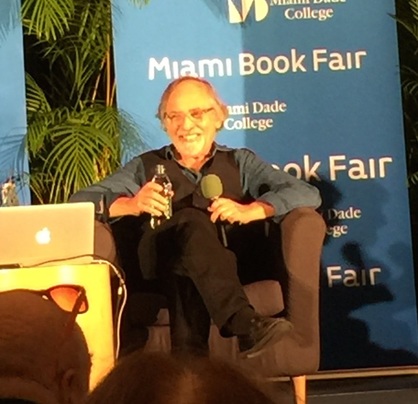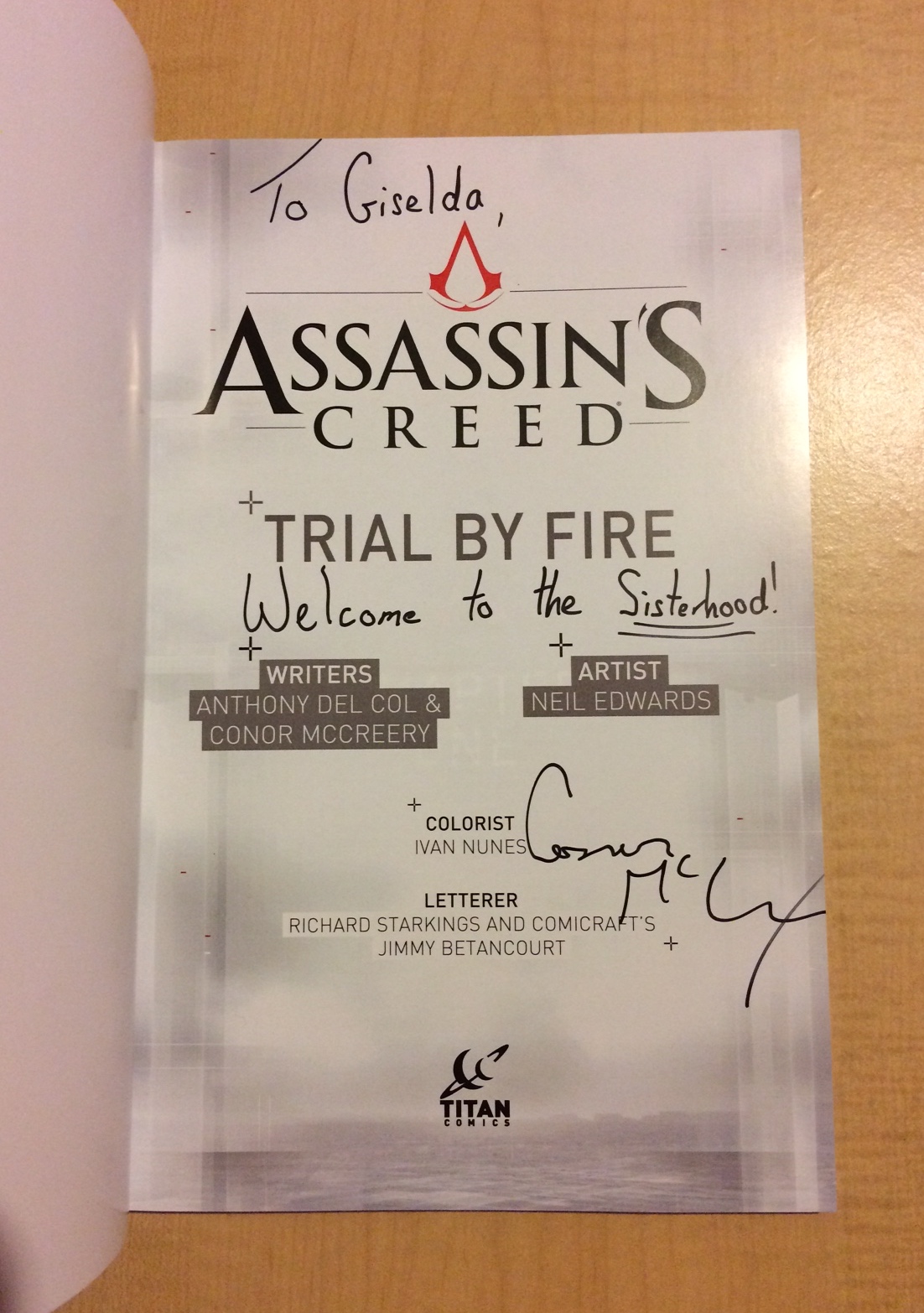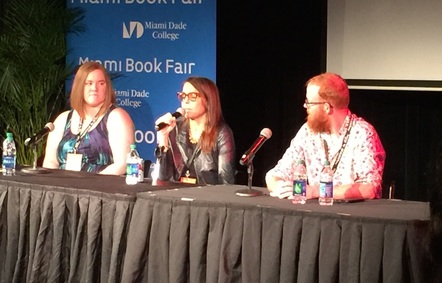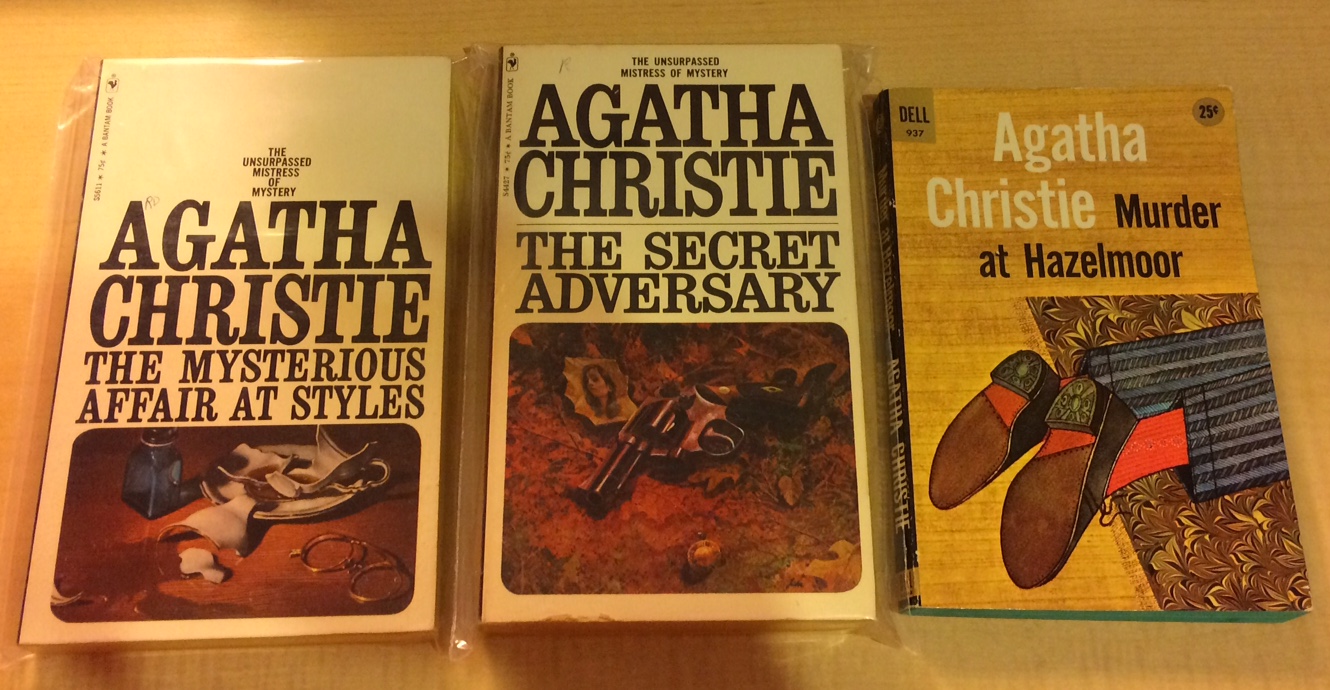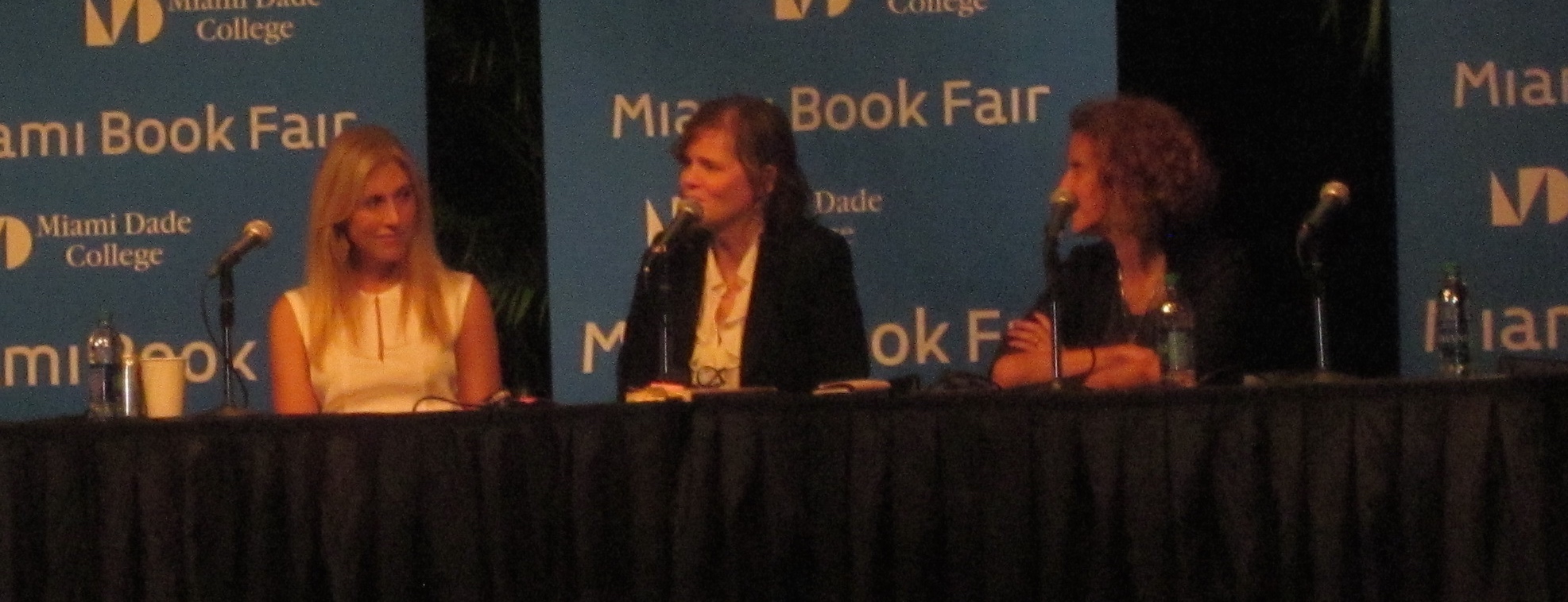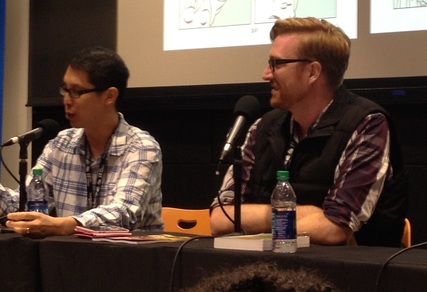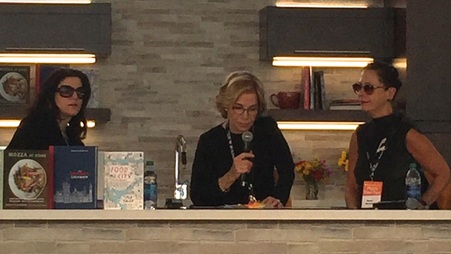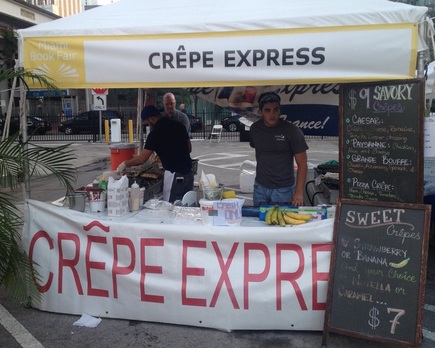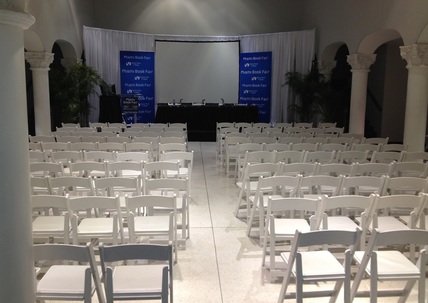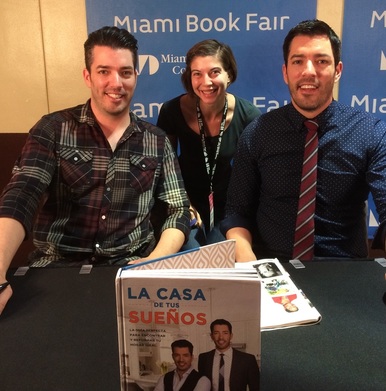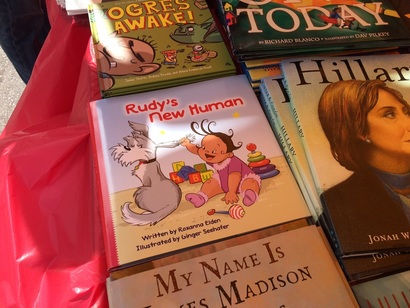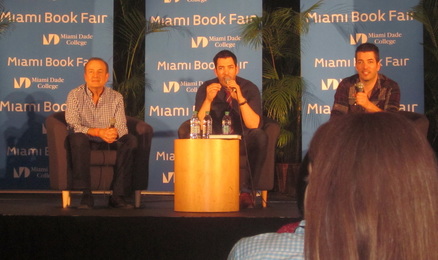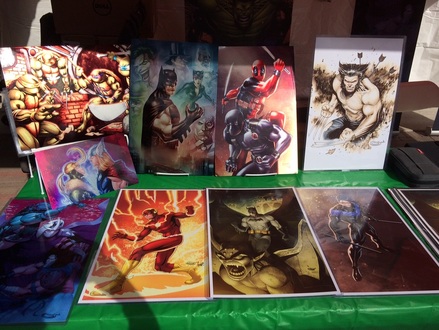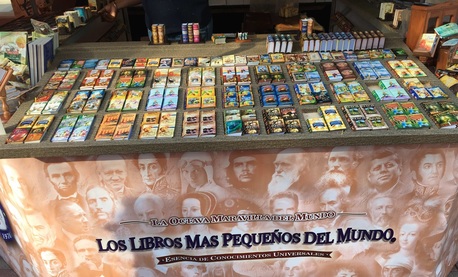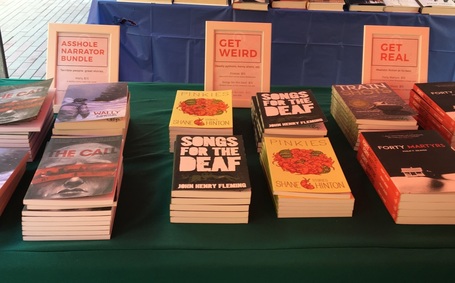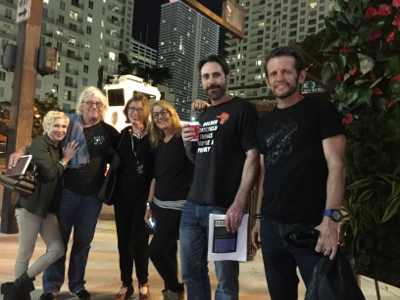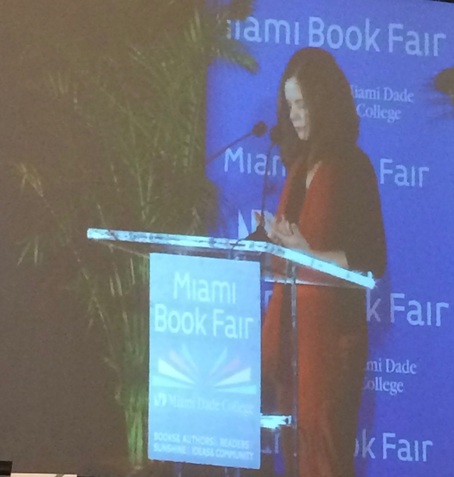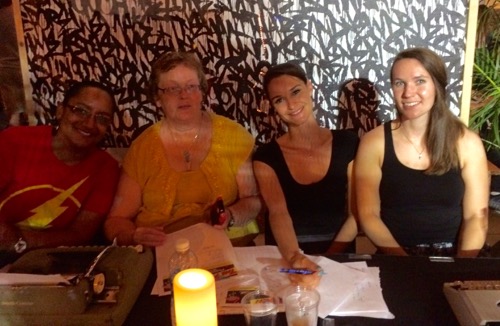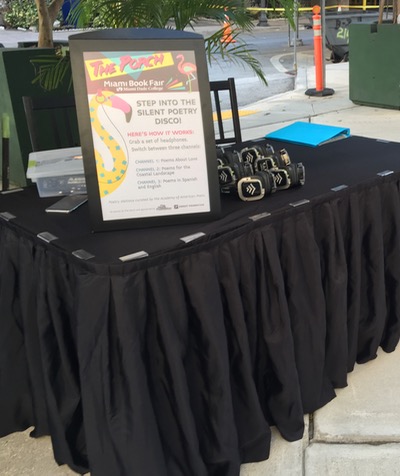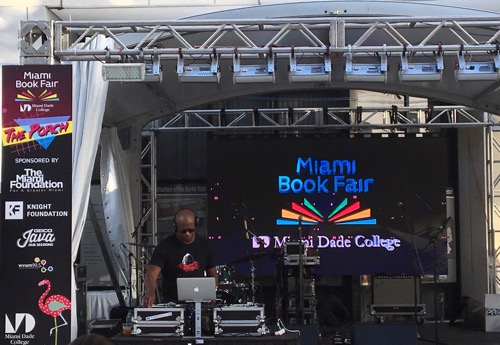Miami Book Fair International 2016 Blog
Join us in person or from afar
EDITOR'S NOTE: This blog is posted with newest items at the top of the left column.
Sunday Nov. 20
Sunday, Nov. 20, 2016, 6:30 PM
Another year at the Book Fair is over. I'm glad I spent my last day in and around Children's Alley. My sister, who accompanies me every year, said something poignant about what makes children's literature great (and sometimes better than "adult" literature): "They give us hope." Even when the protagonist faces something that seems insurmountable—a dark wizard, an oppressive government, evil relatives—he/she takes on the challenge. They usually succeed—even if it takes a few books—and make readers feel that they, too, can overcome any hardship. I think that's a necessary message to think about and put into action during uncertain and troubled times. —Giselda Aguiar Sunday, Nov. 20, 2016, 6:27 PM
It was fascinating to hear poets laureate Rita Dove and Robert Pinsky describe the relationships between poetry and the arts, as well as poetry and science, at “Two Poets Laureate: A Conversation.” Dove related how she became a poet and explained that dance energized her poetry. Pinsky said that poetry is as fundamental and basic to humanity as music. A baby, he pointed out, will be soothed by the rhythm and cadence of the human voice whether it is reciting a poem or singing a lullaby. Both Dove and Pinsky had fathers with careers in science, optometry and chemistry, specifically. Growing up in a scientific family, Dove said, she learned to “keep trying things out.” Pinsky explained that science provides a good model for poetry: “You find your models and you don’t just learn it, you study it.” —Natalie Havlina Sunday, Nov. 20, 2016, 4:47 PM
Renée Ahdieh (The Wrath and the Dawn) came from Seoul, South Korea at the age of nine, and her grandmother gifted her a collection of Nancy Drew books so she could learn English. Ahdieh ended up writing Nancy Drew fan fiction. She and fellow panelist at "Twisted Fairytales," Liz Braswell (As Old as Time), gave advice to writers in the audience. Braswell said to "collect as many rejections as possible" because that shows you're trying. "It's not a bad thing to be critical of yourself," Ahdieh said. "Being critical is about asking questions." She added that if you want to be a writer, you need to surround yourself with people you trust who will tell you to move on from what you've been revising/editing to death. Braswell, explaining her periods when she doesn't write, said you can't shake a tree in winter for not producing leaves. To her, it's normal if a writer goes through spells of no writing, which is something I hadn't heard from other authors, who tend to say "write every day." —Giselda Aguiar Sunday, Nov. 20, 2016, 4:20 PM
At the "Twisted Fairytales" panel, Renée Ahdieh, who is of mixed race, said she didn't grow up reading stories about people like her, so she decided to write stories that were. Her newest book, The Wrath and the Dawn, is inspired by One Thousand and One Nights. She said the latter story is like Beauty and the Beast. Liz Braswell writes "twisted tales" for Disney; the latest one is As Old as Time, a retelling of Beauty and the Beast, which asks, "What if Belle's mother cursed the Beast?" The moderator asked the panelists where they find a "fresh angle" when dealing with stories that have been retold so many times. Braswell said one has to find something that's relatable in the story. Ahdieh added that she loves forbidden love and revenge stories, so take what you love of a "beloved story" and make it your own. Ahdieh and Braswell also spoke of the composing process. Ahdieh quoted George R. R. Martin who said writers are either architects or gardeners: they either create a "blueprint" or they "plant seeds and watch them grow." Ahdieh said she's an architect. Braswell knows the story/characters are good when the characters have their own conversations in her head. The two authors spoke briefly on the new Beauty and the Beast live action film coming out next year. Ahdieh pointed out the fact there's a bit of Stockholm syndrome in Beauty and the Beast and hopes Disney doesn't "romanticize the captor" for a new generation of girls. She was happy with the live action film of Cinderella released last year because Cinderella isn't portrayed as a "doormat" in it. My favorite fairy tale trope is the "Beauty and the Beast" one, so I was shocked to hear Stockholm syndrome mentioned in the same breath (with the Disney version), but it's true. Minus that negative aspect (which doesn't exist in every "Beauty and the Beast" story), I love the idea that someone's love and kindness can transfer over to someone who is lacking in both and, thereby, transform that person into someone capable of loving and goodness. But, yeah, I hope Disney can eliminate that whole Stockholm syndrome from the live action version. —Giselda Aguiar Sunday, Nov. 20, 2016, 4:12 PM
As Cooper signs my book, I thank him for spoiling the ending. I tell him that now I'll actually be able to read the book. "I couldn't have written it if she had died," he says. We share a few brief stories of our own experiences as fathers of girls before I leave, ending my Miami Book Fair 2016 experience. —Ed Irvin Sunday, Nov. 20, 2016, 4:03 PM
My sister, who went to the "Hard Choices, High Costs" panel I decided to skip, told me I missed a great discussion and that I would've gone out to buy Carolyn Cohagan's Time Zero, which is set in a future with strict laws against women and tells how the female protagonist fights against that. Yup, that sounds like something I would buy, so I was right in skipping the panel to save on money. —Giselda Aguiar Sunday, Nov. 20, 2016, 4:02 PM
"The need to know who you are, where you came from, and who you came from is primal," says Danielle Flood, author of The Unquiet Daughter. Flood, the result of a love triangle, says she is the living sequel to The Quiet American that Graham Greene never wrote. Having been given only the name of her biological father, Flood collected phone books from major cities around the world. Upon learning the books were distributed for free, Flood would space out her calls as to not raise the phone company's suspicion. She had as many as seventy-three phone books at one time. —Ed Irvin Sunday, Nov. 20, 2016, 4:01 PM
This is my first chance to write after seeing "Three Lives: Memoirs of Love and Friendship" at 2:00. Paul Lisicky kicked off the event by reading from his non-linear memoir, The Narrow Door, which is, at its core, an elegy for a dear friend of his who died of cancer, and also for the end of a sixteen-year relationship. Of the non-linear structure, Lisicky said, "If you asked me to tell you what I did this morning, I wouldn't be able to tell it in a straight line. My mind is tangential. . . It seemed to be the only way to write the book." Brenda Miller and Julie Wade chose to split their reading time in order to read an essay they wrote as a collaboration. When I asked what they gained from collaboration that they couldn't access through independent writing, they were ready with a flood of answers. Wade was enthused about having another way to get to know Miller's work, while Miller was drawn to the accountability that collaboration gives. "There's somebody there, waiting for you to finish so they can get started. It's very motivating," Miller said. Both women agreed that collaboration offered a beautiful surprise in not knowing where you're going to start your day's work. —Jaimie Eubanks Sunday, Nov. 20, 2016, 3:52 PM
After reading the first chapter, Cooper announces to the audience that his daughter is now a ninth grader. Phew! Knowing it has a happy ending, now I feel better about my chances of being able to read the book. —Ed Irvin Sunday, Nov. 20, 2016, 3:47 PM
Even the volunteer introducing Elisha Cooper, author of Falling: A Daughter, a Father, and a Journey Back, chokes up during his introduction. Now I don't feel so bad for developing a lump in my throat as I read the jacket copy while in line to buy the book. The oncologist tells Cooper that his daughter has a pediatric kidney cancer known as a Wilms' tumor, which the doctor calls "'a good cancer,' a funny pairing of words." I'm not going to be able to read this book. —Ed Irvin
Sunday, Nov. 20, 2016, 3:36 PM
At the "Fathers and Daughters: Memoirs" panel: "I think when you're a person with an interesting family story you avoid writing about it for a long time," says Molly Brodak, author of Bandit: A Daughter's Memoir. Prior to her memoir, Brodak had written poetry. "We weren't surprised; we were relieved," says Brodak about learning that her father had been arrested for robbing eleven banks. "We finally knew something real about my father." In addition to being a bank robber, Brodak's father was also living a double life with another wife and family. —Ed Irvin Sunday, Nov. 20, 2016, 3:30 PM
Full house for the "Baby B Strings" quartet on The Porch. Nice change of musical pace. Crowd demanded an encore. —Bob Morison Sunday, Nov. 20, 2016, 3:26 PM
I encountered a publishing house booth displaying its books. One that got my attention was titled Fidel about the Cuban dictator. I turned the book over to read the back cover. My heart rate increased the further down I read because, according to the summary on the back, Castro is a pretty swell guy who did a lot of good to the island nation. When the woman in charge of the stall came back, I asked if the book had been written by a Cuban. After I was directed to the About Author section, I found out it wasn't. I then said, "Oh, well, I think these are a bunch of lies" before walking away. —Giselda Aguiar Sunday, Nov. 20, 2016, 3:18 PM
I unfortunately had to duck out of the "Florida: The Natural World" panel before hearing Albert C. Hine on Sea Level Rise in Florida, and I saw others bailing too. Such a bummer when panels run overtime. —James Barrett-Morison Sunday, Nov. 20, 2016, 3:17 PM
As she signs my book, Jessica Luther thanks me for my question. There is no one standing in Cyd Zeigler's autograph line, something that seems to happen at a lot of panels and always makes me feel bad for the fan-less author. If I weren't on a tight book budget I would have bought Zeigler's book, too. Their panel was by far the best I attended over the weekend. Although 80 percent of my reading is crime fiction, it always seems to be the non-fiction panels I find to be the most fulfilling at the book fair. —Ed Irvin Sunday, Nov. 20, 2016, 3:14 PM
At the "Friends of the Miami-Dade Public Library" tent, they have leaflets announcing "Save the Dates" for their 25th annual book sale at the county's main branch in downtown Miami. The sale will be next month from December 14th to the 17th. —Giselda Aguiar Ed. Note: More info on the sale can be found at the Friends' website. Sunday, Nov. 20, 2016, 3:13 PM
Spontaneous fun at the Fair department. Was hanging out at the Jai-Alai Books booth when a guy stops by and says, "Great—books on jai alai!" The staff explained that Jai-Alai Books doesn't actually have books on jai alai. They're a local non-profit literary press. Guy said he used to do play-by-play at Miami Jai Alai. Someone asked what the play-by-play sounds like, and he demonstrated. Kind of like an auctioneer talking fronton-speak. The opponents wielded their cestas mightily, we followed the pelota through several exchanges, one player going up the wall, and then the crucial seventh point was scored. Thunderous applause. Announcer is Miami native Freddy Stebbins, who is emceeing on The Porch this afternoon. His day job is teaching social sciences at Miami Dade College. —Bob Morison Sunday, Nov. 20, 2016, 3:09 PM
"The NCAA, at some point, will cease to exist as it does today," says Zeigler in response to my question. "They are scared to impose anything on these schools that will hasten their exit." —Ed Irvin Sunday, Nov. 20, 2016, 3:08 PM
Elaine Mills' art book Gardens of Miami features photos of twenty-seven private gardens that combine tropical, subtropical and temperate plants that thrive in South Florida's microclimate. I was astounded by photos of a garden in Wynwood, which in 2007 was a boring lawn but by 2016 had been rewilded into a gorgeous Pine Rockland environment. —James Barrett-Morison Sunday, Nov. 20, 2016, 3:07 PM
During Q&A I ask Luther her thoughts on the idea that a college coach who gets fired because of the academic or beneficiary violations of his players cannot be hired by another school for so many years without the hiring school partially assuming the sanctions that resulted from the transgressions at the coach's previous school, but a coach who gets fired for turning a blind eye to players who commit felonies such as rape can be hired instantly by another school, as long as that school is willing to face the public backlash, if there is any. Turns out there is a chapter on just that subject, which she calls "The Shrug," as in the NCAA's response to the same question, as if to say "What can you do?" —Ed Irvin Sunday, Nov. 20, 2016, 3:05 PM
Miami Book Fair's "Florida: the Natural World" panel may have just changed my life. I'm a transplant to the state (from Idaho) and there's been some root shock. Panelists Cathy Salustri, Robert Silk, and Elaine Mills showed me a side—or, rather, "sides"—of Florida I hadn't seen before. In fairness to North Miami and its environs, I had seen some nice domesticated plantlife, but nothing to compare with the gorgeous gardens featured in Mills's 400-photo "wish book," Gardens of Miami. Silk also showed photos as he talked about The Ecotourist's Guide to the Everglades and the Florida Keys. One of my favorites depicted a flock of pelicans in the Snake Bite area where, according to Silk, "it's like being in a National Geographic movie." My other favorite showed a cypress dome that was so beautiful I had to believe Silk when he said one gets an "existential feeling" when one is there. As for Salustri, I wish that I had heard her talk or even read her book, Backroads of Paradise: A Journey to Rediscover Old Florida, before I came to school here. Salustri's passion for her state is infectious and, having heard her, I'm plotting ways to get out to explore the "so much more than beaches" she described, "the secret Florida," that includes cotton fields, red clay, and "a little of everything." Roadtrip, anyone? —Natalie Havlina Sunday, Nov. 20, 2016, 3:02 PM
Brooke Hauser, author of Enter Helen: The Invention of Helen Gurley Brown and the Rise of the Modern Single Woman, talked about discoveries she's made since the book was published in April. Helen Gurley Brown was a prolific letter writer, in correspondence with the rich and famous and important. Hauser checked the archives at Smith College for correspondence with Hillary Clinton and Donald Trump. The Clinton stuff was tame. But in the late 80s, Gurley Brown invited Trump to pose nude in Cosmopolitan (with a flowerpot or book providing minimal concealment), à la Burt Reynolds famously back in 1972 and other celebrity centerfolds thereafter. Trump was one of the top choices among "Cosmo girls," as readers were called at the time. She lobbied hard but he declined. Hauser said she laughed hard at first, "but then it wasn't funny anymore. He'd already begun his assaults on women." The things you learn at the Book Fair. I can't help but imagine the missed possibility—the first presidential couple to have both posed in the buff. —Bob Morison Sunday, Nov. 20, 2016, 3:00 PM
After the "Good vs. Evil/Evil vs. Good" panel, I bought the first book of The School for Good and Evil series by Soman Chainani and Snow White: A Graphic Novel by Matt Phelan. I was intrigued with the idea of best friends being so opposite that one goes to a school for good while the other goes to one for evil. I also liked the idea that Phelan was presenting Snow White's story in a more modern way and the gritty, noir feel the images give. In order to save up on money, I decided to skip the three o'clock panel I'd planned on going to because I was scared I'd like the books enough to buy them. So I'm going to walk around to see if I find any bargain books. —Giselda Aguiar Sunday, Nov. 20, 2016, 2:58 PM
"We are very unkind to survivors of sexual violence as a society," Luther says. "It is not uncommon for the person who reports to be an NCAA athlete." —Ed Irvin Sunday, Nov. 20, 2016, 2:47 PM
The crowd clearly turned out to see some beautiful Florida photos, and Robert Silk's An Ecotourist's Guide to the Everglades and the Florida Keys is delivering. The photos, stretching from hiking trails in Big Cypress National Preserve down to Fort Jefferson in the Dry Tortugas (which, I learned, is the largest brick structure in the Americas), definitely support his goal of "deconstructing the myth that Florida isn't for the outdoorsman." —James Barrett-Morison Sunday, Nov. 20, 2016, 2:41 PM
Soman Chainani, Melissa de la Cruz, and Matt Phelan, the panelists of "Good vs. Evil/Evil vs. Good" were asked by an audience member what their favorite books are, not including their own. Phelan said The Once and Future King and The Wheel on the School. De la Cruz said The Lord of the Rings trilogy, the Harry Potter series, and War and Peace. Chainani's are The Westing Game, Charlotte's Web, and the Mixed-Up Files. The authors were also asked who their favorite protagonist and antagonist are: de la Cruz's are Jon Snow and Cersei (both from A Song of Ice and Fire/Game of Thrones), Chainani's are Elizabeth Bennet (from Pride and Prejudice) and Cersei, and Phelan's are Harry Potter and Dracula. The panelists were asked what their Hogwarts House is, to which Phelan said it's the most common question asked in the Author's Lounge. De la Cruz said she thought she was a Slytherin, but was sorted into Raveclaw when she took the Pottermore quiz a few years ago, and was recently sorted into Gryffindor. Chainani declared himself a Slytherin while Phelan admitted he hadn't take the Pottermore quiz, but feels he's a Gryffindor. (As a huge Harry Potter fan, I was ecstatic about all the Harry Potter references and discussions.) The panel ended with de la Cruz saying "there's a book for everyone. . . Find that book that unlocks books for you." —Giselda Aguiar Sunday, Nov. 20, 2016, 2:40 PM
The subject of Donald Trump's idea of locker room talk comes up. Although many athletes have denied that such banter happens in their locker rooms since the president-elect made the comments, Zeigler says "It is how a lot of men talk when they don't think anyone is listening..." "...except other men," Luther interjects. "By 'locker rooms,' I think Trump meant male-only spaces," she adds. "We understand, as a culture, that the locker room is a space that is very sexist and homophobic," Zeigler says. For that reason, "Locker room talk is the biggest reason LGBT athletes fear coming out." —Ed Irvin Sunday, Nov. 20, 2016, 2:31 PM
"No one in sports wanted to talk about gay athletes and no one in the gay community wanted to talk about sports," says Cyd Zeigler, author of Fair Play: How LGBT Athletes are Claiming Their Rightful Place in Sports, on the idea of gay athletes in sports when he founded his website, outsports.com, in 1999. "It's hard to say we've claimed our place in sports when so many athletes in men's sports are afraid to come out," Zeigler says, although he does believe significant progress has been made. "Sports as a cultural institution is no longer homophobic." —Ed Irvin Sunday, Nov. 20, 2016, 2:26 PM
At the "Good vs. Evil/Evil vs. Good" panel, author of The School for Good and Evil series, Soman Chainani, brought up four kids onto the stage to test whether they are good or evil, and the judges determining if the children are good or bad are Chainani's fellow panelists, Melissa de la Cruz and Matt Phelan. To the first kid, Chainani gave a scenario: he encounters a perfect, elaborate sand castle at the beach. Does he add to the castle or knock it down? The kid said he'd add to it. The audience laughed as Chainani said he did not believe him, but the boy was declared good. The second child's scenario: her parents leave her home alone for an hour and they tell her to read and not destroy the house. Does she read or destroy? She said she would read, so she was deemed good. The third scenario: the boy is in a swimming pool with his friends and he needs to pee, but the closest bathroom is ten minutes away. Does he go to the bathroom or does he pee in the pool? The child said he "couldn't answer" the question because he was "uncomfortable." He walked off the stage as everyone laughed. Chainani, however, brought up a kid who said he would pee in the pool. De la Cruz said peeing in the pool wasn't evil, "it's practical." The fourth child's scenario was what would she do in a sword class if, when the teacher isn't looking, a student jabs her in the back. She said she would jab back. Even Phelan said he would do the same. He added that he might not agree with villains, but he understands them. —Giselda Aguiar Sunday, Nov. 20, 2016, 2:22 PM
First up in the "In the Heartland: Nonfiction" session, Fernanda Santos read from and discussed The Fire Line: The Story of the Granite Mountain Hotshots and One of the Deadliest Days in American Firefighting. The lengthy title tells the story. As the Phoenix bureau chief for The New York Times, Santos covered the 2013 fire outside Prescott, AZ, that claimed the lives of nineteen firefighters, fourteen of them in their twenties, three of whom had a first child on the way. The book is about the firefighters and their families as much as the fire. Santos described both the high risks and the special teamwork of the hotshots. She read a chapter recounting a father riding down the mountain with the bodies of the dead firefighters, his son among them but not yet identified. So he accompanies them all, a few at a time. The Fire Line has much in common with Young Men and Fire, about the smokejumpers killed in a 1949 Montana fire, another of the deadliest days. S. L. Price makes regular appearances (eight to date) in the Best American Sports Writing series. His new book is Playing Through the Whistle: Steel, Football, and an American Town. The town is Aliquippa in western Pennsylvania, population about 9500 (down from 27,000). Once a thriving steel mill town, it has been in decline for decades. That doesn't make it unique, but its high school football team does. In a region known for producing football stars (Namath, Montana, Dorsett, Marino), Aliquippa has by itself sent Mike Ditka, Ty Law, and Darrelle Revis to the NFL. With just thirty-six boys in a recent senior class, the team played for a state championship. Price sees more in Aliquippa than just another small town whose identity is wrapped around high school football. "It is a place where America kept happening." Immigrants went there straight from Ellis Island. Black Americans migrating north found work there. A legal test case for the labor movement was the "Aliquippa 10." In World War II, the town manufactured weapons. In the 60s, it had race riots. Today the town embodies the political disaffection of America's heartland. Comfortable middle class life—steady job, house, small boat, vacation, respect—has pretty much disappeared, and people are angry. Price read a chapter on Ditka, known for his relentlessness as a player and his sideline eruptions as a coach. Behind those eruptions are some of the same experiences, frustrations, and defiance that propel a football town. —Bob Morison Sunday, Nov. 20, 2016, 2:21 PM
As always for Florida-themed panels, "Florida: The Natural World" has drawn a packed house. The panel kicked off with a talk by Cathy Salustri, a self-described "freak when it comes to anything about Florida." She was inspired by a 1930s WPA Florida guidebook, co-authored by Zora Neale Hurston, to create Backroads to Paradise: A Journey to Rediscover Old Florida. —James Barrett-Morison Sunday, Nov. 20, 2016, 2:15 PM
Three other Ivy Rosettes introduced the writers of the "Good vs. Evil/Evil vs. Good" panel taking place the Wembly's Author Tent: Soman Chainani, Melissa de la Cruz, and Matt Phelan. De la Cruz, speaking of her latest Descendants book, Return to the Isle of the Lost, explained that the children of the Disney villains were banished from the Isle and they live in the kingdom of Auradon, which is ruled by the Beast and Belle's son. Phelan, whom I saw yesterday at the "New Takes on Tales Retold" panel, again spoke of his book, Snow White: A Graphic Novel, which is set during the Great Depression. He described the book as looking a bit noir. He sold me on "noir." Chainani said he grew up on a "diet of Disney cartoons" and found himself rooting for the villains, hence his series The School for Good and Evil. Those who go to the school for good are an "ever" and those at the school for evil are a "never." He explained that in the books two best friends are switched, sending one, who by all means should've gone to the school for good, to the school for evil and the other who should've gone for evil goes for good. The series is about answering why this happened. Chainani asked the other panelists which side they root for. De la Cruz said the villains, stating that Maleficent is her favorite villain. Phelan said he's "pro-good," which got a few boos from the audience and his fellow panelists. He further explained he found it "amazing" that the huntsman in Snow White chooses not to kill Snow White, not because she's pretty ("that's not good enough"), but because she's a "good person," an "optimist." Phelan said the idea of optimism is especially necessary in "these times." —Giselda Aguiar Sunday, Nov. 20, 2016, 2:13 PM
"I wrote a downer of a book about college football and sexual violence," says Jessica Luther, author of Unsportsmanlike Conduct: College Football and the Politics of Rape, at the "Edge of Sports" panel. "About forty percent of rapes involving athletes involve multiple perpetrators," says Luther, adding that sexual assault is "a massively under reported crime." About ninety percent of sexual assaults go unreported. She goes on to say that, in college towns where football is a religion, victims of sexual violence live in fear of reporting. Luther faced horrible backlash herself when asking questions about the Jameis Winston case at Florida State, where she went to college. —Ed Irvin Sunday, Nov. 20, 2016, 1:57 PM
I loved hearing translators Mariela Griffor and Forrest Gander read excerpts from their new translations of Pabulo Neruda. Griffor's Chilean accent imbued her reading of Canto 7 from "Canto General" with dignity and authenticity. Gander's enthusiasm for Neruda's lost poems and his energetic delivery would have sold me on Neruda even if it he weren't, well, Neruda. Eddie Krzeminski, a poetry student in Florida International University's MFA program, was so overwhelmed by the experience of this panel he was unable provide any comment other than, "It was cool." —Natalie Havlina Sunday, Nov. 20, 2016, 1:46 PM
Most authors feel anxious when they think about their parents reading their memoirs. This was particularly true for Sulome Anderson, who said it was scary for her to share her book with her father. Her father is Terry Anderson, who in 1985 was the A.P. Middle East bureau chief when he was kidnapped in Beirut by a Shiite Muslim militant group. Her book is The Hostage’s Daughter: A Memoir of Family, Madness and the Middle East. Anderson’s mother was six months pregnant when her father was kidnapped, one of dozens of foreigners kidnapped in what became known as the Lebanese hostage crisis. She met her father for the first time when he was released nearly seven years later. “I grew up around war and war correspondents,” said Anderson, who like her father became a journalist. When a woman in the audience asked if she considered herself brave for having travelled throughout Lebanon to learn the details about her father’s kidnapping and years as a hostage, she replied with her own question and wondered, “Am I brave or just an idiot?” She resisted giving her father a copy of her book for as long as she could. At his insistence, she relented and provided him with a PDF version. He devoured it within two hours. Anderson recalled that her father, in tears, said to her afterwards: “It’s the best piece of writing I’ve ever read.” —Roberto Manzano Sunday, Nov. 20, 2016, 1:45 PM
Just sneaked out of the "Truth and Consequences" reading, where Robert Olen Butler, Juan Gabriel Vasquez, and Ha Jin all read from their most recent novels. I had to leave early, so I could make it to "Three Lives: Memoirs of Love and Friendship" at 2:00. Vasquez's portion of the event was probably my favorite. He was so conversational when he introduced his work. His novel, Reputations, was released in 2013. "It's already a book from the past. It's been so long that it almost feels like reading from somebody else's book. We'll see if I like it." —Jaimie Eubanks Sunday, Nov. 20, 2016, 1:37 PM
The music and noise coming from the tent next door—it sounds like a dance party for children—has forced Augusta Scattergood to walk off the stage in order to get closer to the audience here at Wembly's Author Tent. Since the first row of chairs is for kids, they are closest to Scattergood and she's speaking directly to them, asking them questions and having them speak into the mic she's holding so the rest of us can hear. Scattergood writes historical fiction, and when she was trying to find the voice of her titular character in Making Friends with Billy Wong, set in the 1950s, she told the crowd she went out and sat under a palm tree with a notebook to find it. She added that the story wouldn't be interesting without a "bad guy." (She asked the kids at the front what we call the bad guy in a story and one of them answered "villain.") Scattergood added, "If you write a story, put a little bit of yourself in it." —Giselda Aguiar Sunday, Nov. 20, 2016, 1:28 PM
In such a historically intense moment, I was intrigued to hear the takes of three authors of speculative fiction at the "Strange New Worlds" panel, whose most recent works are set in disparate versions of America. Claire Vaye Watkins described how her childhood in a rural village on the fringes of Death Valley influenced her novel, Gold Fame Citrus, set in a future dystopian California locked in endless drought. Not just from the dry landscape, desertified by the demands of thirsty Los Angeles, but because of the proximity of WWII-era Japanese internment camps. Inequality and lack of freedom is also crucial in Ben H. Winters' Underground Airlines, a bounty-hunter thriller set in a modern America where slavery still exists in four states. Aaron Thier read from Mr. Eternity, a pseudo-novel of five intertwined stories stretching across ten centuries, united by a mysterious immortal man who appears in all. He read from a section about a princess of St. Louis, Missouri, in the late 2400s. In the Q&A, the three discussed how genres like science fiction, alternate history and historical fiction, despite often being far removed from the present moment, act as a "lens for thinking" about the present and our place in history. —James Barrett-Morison Sunday, Nov. 20, 2016, 1:26 PM
Lauren Wolk normally writes for adults, but when she wrote Wolf Hollow, which she thought was for adults, her publisher said the protagonist is an eleven-year-old girl, so it's for younger readers. Annabelle, the protagonist, befriends Toby, an older, traumatized veteran of WWI. He is obviously the older one, but is the weaker one, so Annabelle has to be brave and strong for the both of them. —Giselda Aguiar Sunday, Nov. 20, 2016, 1:20 PM
Three young ladies—Ivy Rosettes—introduced the authors of the "Culture, Class, and Identity" panel: Augusta Scattergood, Lauren Wolk, and Reyna Grande. The first to present and read from her book was Grande, who is promoting The Distance Between Us, an autobiographical account of her childhood. The first half is of her growing up in Mexico without her parents after they left to the U.S. and the second half is of her own border crossing. When Grande was two, her father left for the U.S. and returned eight years later. The first scene she read was of her meeting her father, a stranger. Because he looked like a "beggar," Grande felt ashamed upon seeing her dad. The second scene she read was of when, as a nine-and-a-half-year-old, Grande met "that border that had separated [her] family." Grande explained her choice of writing the book from a child's perspective, saying it's one shared by millions of children, and that the trauma of crossing into the U.S. begins before the actual crossing: it starts when the child is left behind and the fears that come with it. —Giselda Aguiar Sunday, Nov. 20, 2016, 12:55 PM
I'm inside the Wembly's Author Tent in Children's Alley waiting for the "Culture, Class, and Identity" panel to begin. The first row of chairs are tiny ones for the children in the audience to use. I plan on attending panels today that are in the Children's Alley or the MDC Live Arts Lab, the latter normally hosting YA authors. Once in a while, we all need a break from adulting. —Giselda Aguiar Sunday, Nov. 20, 2016, 12:44 PM
I wasn't able to attend the Bernie Sanders talk last night, but Leenie Moore, a graduate student at Florida International University, told me about her experience. She says Sanders's talk was very inspiring. Moore thinks that his most powerful statement was, in essence: the one thing we can't do is despair, because we don't have the moral right to give up. —Natalie Havlina Sunday, Nov. 20, 2016, 12:22 PM
I'm here for "Truth and Consequences: A Reading from Three Novels" with Juan Gabriel Vasquez, Ha Jin, and Robert Olen Butler. I should have brought my copy of Tabloid Dreams for Butler to sign. What a missed opportunity. —Jaimie Eubanks Sunday, Nov. 20, 2016, 12:16 PM
I got my copy of Rudy's New Human signed by its human author, Roxanna Elden, and "paw-tographed" by its dog narrator, Rudy. Elden, who is Facebook friends with me, said my posts—most likely my recent ones dealing with the election—speak of "the beauty and the pain" of life. I was touched. —Giselda Aguiar Sunday, Nov. 20, 2016, 12:15 PM
I’ve often wondered, how do you write good fiction that was unabashedly inspired by real people and real events, fiction that even keeps real people's real names? By sharing her techniques, Amy Stewart, author of Lady Cop Makes Trouble, helped me understand how. “I’m trying to keep what really happened and use fiction to fix the holes in the story,” said Stewart, whose novel is the second in her “Kopp Sisters” series. The series is inspired by the real life sheriff’s deputy Constance Kopp, who was hired in 1915 in Bergen County, N.J. Stewart said she also rearranges cases chronologically and compresses time periods so the books can hang together better. “I very much want to tell their story,” Stewart said about the real life Kopp sisters. —Roberto Manzano Sunday, Nov. 20, 2016, 12:00 PM
Roxanna Elden, author of Rudy's New Human, read the book to a group of children at the Once Upon A Time Stage with the aid of a screen that displayed each page of the picture book. After the reading, the crowd was introduced to the special guest: Rudy, Elden's dog and inspiration for the narrator/title character of the book. Elden talked a bit more on how the book came about, and it stems from "pet parent guilt" when she had her first child and focused her attention more on the baby than on Rudy. When Elden spoke with her friend Ginger Seehafer—the illustrator of Rudy's New Human—over her concerns about Rudy feeling left out, Seehafer said her eldest son felt the same when she had her second child. And so, the story was born. Elden explained that Rudy would also be signing books with the stamp she had made of his paw. She encouraged the crowd to get their books "paw-tographed." —Giselda Aguiar Sunday, Nov. 20, 2016, 11:54 AM
My annual Book Fair arepa was presented a little differently than I'm used to—with a fork! Tasted the same though; delectable, as usual. —James Barrett-Morison Sunday, Nov. 20, 2016, 11:51 AM
I'm about to see my high school creative writing teacher, Roxanna Elden, read her picture book, Rudy's New Human, at the Once Upon A Time Stage in the Children's Alley section of the Fair. She gave me a big hug before running on stage as a crowd of small kids gathered. —Giselda Aguiar Sunday, Nov. 20, 2016, 11:32 AM
Billy the Marlin—the mascot of the Miami Marlins—sat next to me as I was eating and patted me on the back. "No," I said. And he (or she) left. Being in a costume doesn't give you the right to touch people without their consent. Boundaries. Respect them. —Giselda Aguiar Sunday, Nov. 20, 2016, 11:30 AM
I set aside some of my morning for holiday shopping. I seem to have only bought presents for myself. Up next, a reading by Robert Olen Butler at 12:30! —Jaimie Eubanks Sunday, Nov. 20, 2016, 11:28 AM
I had the pleasure of introducing the authors at the early bird (10:00 AM) session in the Auditorium. In recent years, the Book Fair Gods have rewarded early risers with a trio of great and diverse fiction writers in this time slot and venue. Today was no exception and a large crowd was on hand. The session followed a tragic-to-comic arc. Affinity Konar read from her novel Mischling, drawn from the true story of 12-year-old twin girls sent to Auschwitz. They take turns narrating chapters. The voice of Stasha is raw and emotive; she seeks revenge. The voice of Pearl is more precise and reliable; she seeks restoration and forgiveness. Konar's lyrical language is in relentless counterpoint with the action of the novel, the first part orchestrated by Josef Mengele, the second part a quest for survival. The title character in Amor Towles' novel A Gentleman in Moscow is an aristocrat exiled to the best hotel in town in post-revolution Moscow for the heinous crime of a counter-revolutionary poem. Towles set the backdrop, with a slide show, of the full-circle career of the Metropol hotel: from where upper-crust Muscovites socialized to makeshift government headquarters and barracks to relative luxury again as the only place for housing foreign diplomats and journalists the new regime wanted to impress. We also learned that the Russian overlords were adept at photoshopping from day 1—didn't Trotsky used to be in that photo? Nathan Hill opened with a brief section of The Nix that turned out to be a prescient homage to the Chicago Cubs. He then read a hilarious chapter in which a reclusive Internet gamer, under doctor's orders to improve his diet, must repeatedly enter the alien and unvirtual world of an organic food store. Even an oversupply of eggplant does not impress the goddess checkout girl and earn him the magic talisman for graceful exit. The Q&A featured fans of all three authors, so there was a lot of spoiler-alerting going on to protect the audience members who were about to buy the books. —Bob Morison Sunday, Nov. 20, 2016, 11:25 AM
Thank you Affinity Konar, author of Mischling, for my favorite author quote: “As a child, I had an unhealthy obsession with Nazi hunters.” Amor Towles, who shared the panel with Konar and author of A Gentleman in Moscow, got to hear words from an elderly woman in the audience that surely warmed his heart. “It affected my life—your story,” she said. “I think of the count many times in my life.” —Roberto Manzano Sunday, Nov. 20, 2016, 11:22 AM
It's a bit early, but I've decided to eat now because today is going to be a jam-packed day of panels and I might not have time later. I returned to the Thai place at the food court, where I ate yesterday, and got their combo that comes with two sides and one meat. I chose fried rice, lo mein noodles, and chicken on a skewer. Yum. —Giselda Aguiar Sunday, Nov. 20, 2016, 11:21 AM
The connection between poetry and music was particularly evident at the panel I just attended. Poet Monica Youn's voice itself is melodic and she reads with a rhythm and a deliberation that amplifies her poetry's musicality. Joy Harjo actually chanted the first poem she read, "Sunrise." It was as haunting as any Gregorian chant I've ever heard, but much more natural. The highlight of Amir Majmudar's reading was a poem called "DEFCON 1," commissioned for the opening of a civil rights museum that will open in 2017. Majmudar didn't read this poem; he performed it. In addition to the constant gestures that punctuated the other poems he read, Majmudar built "DEFCON 1" to a crescendo that made me want to cheer. —Natalie Havlina Sunday, Nov. 20, 2016, 11:20 AM
"I want to write novels around social issues," says Gillian Royes, author of The Goat Woman of Largo Bay, the fourth in her Shad Myers series. "The social issues of Jamaica are not of interest to the rest of the world," she adds. "I wanted to present a young, black, Jamaican man who was not a Rastafarian, not a criminal, not a laughable man, although Shad does have a great sense of humor. He's a wily character with a heart of gold." Royes goes on to say that she wanted to erase the stereotype of the young, black, Caribbean man. "Jamaicans are very ambitious; we're known as hustlers. Every Jamaican has a hustle." —Ed Irvin Sunday, Nov. 20, 2016, 11:13 AM
At the World Spicery tent, the place I walked away from yesterday because of the temptation it presented with its fragrant tea leaves, my sister bought three packs of teas. Temptation got her. —Giselda Aguiar Sunday, Nov. 20, 2016, 11:11 AM
It seems like every year I lament the number of people who enter panels late. Tardiness is my number one pet peeve. I don't know if it's a scheduling issue; maybe the Fair would be better off putting more time between panels. It is difficult to stand in line to get a book signed with only a fifteen minute buffer, at best. Still, if I can't get to a panel on time, I just skip it in the name of common courtesy. —Ed Irvin Sunday, Nov. 20, 2016, 11:05 AM
Searching for a Spanish book for my mom—an annual tradition at the Book Fair—I got her the Spanish translation of The House on Mango Street at the "Support Children's Literacy" tent. I got myself cute little tote bag for a dollar there. —Giselda Aguiar Sunday, Nov. 20, 2016, 11:04 AM
In the "Mysteries" panel, Lawrence M. Levy, a two-time Emmy nominated television writer whose credits include Saved by the Bell and Seinfeld, reads from Second Street Station: A Mary Handley Mystery: "The man's voice seeped into the house like a cold, wet draft." For some reason the simile strikes a chord with me. Levy calls the robber barons of 1890, the time in which his novel is set, the one-percenters of today. —Ed Irvin Sunday, Nov. 20, 2016, 10:55 AM
I thought it would be liveblog-appropriate to venture out to Building 7 for John P. David's How to Protect (or Destroy) Your Reputation Online. He gave examples of online nightmares, from those doing dumb things and posting them on Facebook to those whose reputations have been damaged by association. One guy had his business impacted because his son had a series of legal battles that took over the top Google slots in a search for their shared name. Who knew that having a Jr. could impact your digital reputation? David also covered what to do if someone is targeting you or your reputation for harassment, on message boards or review sites like Yelp. His advice: monitor your online presence, get in touch with sites to have offending content removed, and know when to contact a lawyer. There wasn't a big turnout—not a surprise for a 10 AM Sunday panel—which is disappointing for a topic that's so critical to our modern, online life. —James Barrett-Morison Sunday, Nov. 20, 2016, 10:45 AM
There's nothing like stopping by the University Press of Florida tent and finding a blurb from your review of Bob H. Lee's Backcountry Lawman on the back cover of the trade paperback edition. —Ed Irvin Sunday, Nov. 20, 2016, 10:18 AM
I was expecting it and it finally happened: I heard someone at the Book Fair say something about the recent elections and protests that I did not agree with. Since it was a conversation between a passerby and the seller of the tent I was at, I quietly walked out of the booth and made my way to another, choosing not to get into an argument with strangers and also deciding not to purchase anything from there. I returned to "Glover's Bookery" for another vintage Agatha Christie book, this time Miss Marple's first novel: The Murder at the Vicarage. —Giselda Aguiar Sunday, Nov. 20, 2016, 9:17 AM
Another beautiful day for Book Fairing. Mostly sunny, some passing clouds, temperature in the 70s—welcome to the temperate season in South Florida. —Bob Morison Saturday Nov. 19Saturday, Nov. 19, 2016, 8:05 PM
Bernie Sanders received four standing ovations. People wore T Shirts with bird figurines affixed to the shoulder, leggings with his face printed all over, and actual Bernie Sanders costumes, wigs and all. Sanders had a lot to say about our current political climate. He spoke about the issues we face: the exorbitant cost of child care in the U.S., healthcare, campaign finance reform, institutionalized incarceration. But he also walked through a timeline of darker times, and how far we have come as a nation. He reminded the audience of the emancipation of slaves, of women's suffrage, of the great strides made in the LGBT community over the past thirty years. He spoke on a number of issues facing our nation, including the trepidation many feel in the face of our most recent presidential election. I'll only quote him once, because everything else he said related to this one call to action. "Democracy is not a spectator sport. "We have come a long way in this nation, and what I say to Mr. Trump: we are not going backwards." —Jaimie Eubanks Saturday, Nov. 19, 2016, 6:33 PM
There were hundreds of people queued up in the stand-by line hoping to hear Senator Bernie Sanders. People with tickets were already packing into Chapman, the Book Fair's largest venue. Not really one for crowds, I gave my ticket to a young woman at the head of the stand-by line, who'd been there since 12:30. Looked like a couple of dozen stand-bys may have made it into Chapman. The rest mostly fit into a nearby room that streamed the session. Anticipating an overflow, Book Fair staff also arranged for streaming outside Chapman, at the main crossroads, and on The Porch. Sanders is still campaigning—and for a bunch of sensible things. Hope he keeps it up. —Bob Morison Saturday, Nov. 19, 2016, 6:10 PM
Best answer of the weekend to the stock question, "Why did you get into writing?" Florida Book Award winner Patrick Kendrick (Young Adult category for The Savants) said that he'd been a fine arts major. "When you're young, you move a lot, and transporting a bunch of canvases and bronzes got cumbersome. With writing, all your stuff fits in a box." —Bob Morison Saturday, Nov. 19, 2016, 6:06 PM
At the Florida Book Awards panel, Arva Moore Parks discussed George Merrick, Son of the South Wind: Visionary Creator of Coral Gables, and drew many of the questions from the audience. Guy next to me asked whether Merrick ever got lost in the Gables because the streets are so similarly named and angled every which way. "And is there really a Caligula Avenue? What was he thinking?" We don't know whether Merrick ever needed directions to get out of his own town, but we learned that when he ran out of Spanish words he resorted to Italian. Google Maps shows about two dozen abodes on Caligula Avenue. Caligula (little boot) was the Emperor's nickname. Gaius Julius Caesar Augustus Germanicus Avenue might have been easier to find, even in the Gables. —Bob Morison Saturday, Nov. 19, 2016, 6:00 PM
I read Maus when I took a Holocaust literature class my junior year at the University of Miami. (One of the best lit. classes I ever took.) Maus was the first graphic novel I ever read. I was 21. I'd looked down at comics thinking they were for children, but Maus changed my mind, and I've gone on to read plenty of other graphic novels. And one of my proudest moments as an undergrad was when I wrote my last course paper for that Holocaust lit. class on Maus and two other works, discussing the notion of heroes and heroism in Holocaust literature. So the author I was the most excited to see this whole weekend was Art Spiegelman because of all I've previously stated. I brought my copy of Maus to get it signed. When I reached Spiegelman, who'd been signing other people's books, I was turned away. He was only signing copies of Si Lewen's Parade: An Artist's Odyssey, not any of his other works. I had not bought his newest book. While I stared at Spiegelman in silence, I stepped to the left and allowed the next person in line to reach Spiegelman. I am disappointed. I saw as others were turned away as well, and I cannot understand why this happened. There can't have been more than 35 people total, some in pairs or in groups, who lined up to get Spiegelman's autograph, so it wasn't a tactic to move the line along. (It took longer to explain to people who were denied a signature why they were being rejected than if their book had been signed.) In the years I've been coming to the Book Fair and to other author events at bookstores and college campuses, I'd never seen fans turned away for having the "wrong" book. —Giselda Aguiar Saturday, Nov. 19, 2016, 5:43 PM
Kate Bornstein and Laura Jane Grace spoke to a packed room— standing room only, would-be spectators peering in through the doors—at “Gender Transitions: Two Memoirs.” Bornstein and Grace described their journeys and addressed our collective fears about the road ahead. It was inspiring and heart-breaking and consoling. It was family. As befits a book fair, much of the conversation was about language, including the evolution of the word “tranny” and the creation of the term “gender euphoric” as a response to “gender dysphoric.” It was also about writing. Grace has been keeping a journal since the age of eight, when a school assignment got her started. She also began expressing herself in song lyrics long before she came out, expressing herself so clearly, in fact, that she marveled her bandmates in Against Me didn’t catch on. The panelists also talked about anger and fear, specifically transphobia. Anger can be a good motivator, Bornstein said, but it's not a good basis for decisions. Fear is not the same thing as depression, Grace explained to the audience, and “fully realizing the fear” is both liberating and empowering. For Yannel Celestrin, a graduate student at Florida International University, the most striking part of the talk was Bornstein's advice about gender: "Just have fun with it!" —Jaimie Eubanks Saturday, Nov. 19, 2016, 5:30 PM
By the end of the conversation between Art Spiegelman and Charles Kochman about the late Si Lewen, they had to rush through the presentation because the room will host Bernie Sanders right after—and by "right after" I mean 6:30 PM. I'm not sure why the Spiegelman event needed to end an hour before the next one. I suppose it has something to do with the fact that the Sanders event is sold out and those in charge want to check tickets and fill the room as soon as possible. I also expect there to be a lot of standbys hoping to get in. Good luck with that. Before the event was over, Kochman, who was rushing through the slide presentation, encountered some technical difficulties when the video he wanted to play did not want to work. Spiegelman made a joke, saying, "Bernie will be sitting on my lap soon." Kochman, while clicking away on his laptop to make the video play, said that since we had to wait for Bernie to drop out of the presidential race, he can wait for us now. —Giselda Aguiar Saturday, Nov. 19, 2016, 5:17 PM
When doing research on wordless books, Art Spiegelman came upon an "obscure picture story done after the war": Si Lewen's The Parade. The book Spiegelman is promoting is Si Lewen's Parade: An Artist's Odyssey, an accordion book that has Lewen's wordless The Parade on one side and Spiegelman's essay on Lewen and their friendship on the other. Spiegelman said Lewen believed "art is priceless" and not a commodity, so the older man allowed Spiegelman to use The Parade in this new book. Charles Kochman, in charge of the visual aids, played a short film of The Parade: A Story in 55 Drawings with music. After the video, Spiegelman quoted Albert Einstein's letter to Lewen: "'Our time needs you and your work.'" Spiegelman and Kochman further discussed Lewen's work, including the Trail, which can be viewed here, that shows a trail of clothes that ends with a reddish glow. Although the trail of discarded clothes is supposed to signify what happened to those who were murdered at Auschwitz, some people have viewed the images and believed it was about sex. Lewen attempted to cut off his hand when he'd had "enough" of art. While he failed to chop off his hand, he could no longer paint with his right hand and his left hand wasn't up to par, so he turned to sculpting, creating hands coming out of the floor. Lewen died earlier this year, ten days after the release of Si Lewen's Parade: An Artist's Odyssey. —Giselda Aguiar Saturday, Nov. 19, 2016, 4:55 PM
Authors Lisa Napoli and James Andrew Miller inspired me because they wrote their books despite often fierce resistance from those they wanted to interview. In fact, that lack of cooperation only served to increase their curiosity and determination. “The more they told me they weren’t going to tell me something, the more curious I got,” said Napoli, who wrote Ray & Joan: The Man Who Made the McDonald’s Fortune and the Woman Who Gave it All Away. Napoli was referring to the lack of help from the McDonald’s Corporation. Nevertheless, three years of research consumed Napoli so she could learn the intertwined stories of McDonald’s, Ray Kroc and his wife Joan, who as Napoli put it, after Ray’s death “morphed into one of the great philanthropists of the twentieth century.” Joan Kroc donated $200 million to NPR in 2003. Miller encountered difficulty getting interviews for his previous books about ESPN and Saturday Night Live. It was a similar dynamic with Powerhouse: The Untold Story of Hollywood’s Creative Artists Agency, though he still managed to interview more than 500 people for an oral history about the secretive agency. “I had to pierce the bubble, look behind the red curtain of CAA,” Miller said. “If you’re an agent your job is not to talk about yourself, it’s to talk about your client.” So what’s his secret for entering worlds where he is initially unwelcome? “I just do a lot of threatening and begging,” Miller joked. Actually, there’s a method to Miller’s persistence. First, he said he signs a deal with his publisher before he approaches his book’s subjects. Then he has a standard pitch that he uses to encourage interviewees to either cooperate or to forever hold their peace. “Look, I got three kids to support. I signed a contract. I’m gonna write this book with or without you.” —Roberto Manzano Saturday, Nov. 19, 2016, 4:50 PM
Art Spiegelman's publisher was glad Topps Company had artists compose the Garbage Pail Kids anonymously because Spiegelman, who was one of these artists, wouldn't have been taken seriously. Charles Kochman showed one of Spiegelman's Garbage Pail Kids: "Snooty Sam." This hideous child is a Garbage Pail Kid as Uncle Sam picking his nose. Spiegelman said it's still the same now, "but with smaller hands," a reference to President-elect Trump. And while Spiegelman started with the Garbage Pail Kids, Kochman said Spiegelman has done a lot to bring graphic novels into literature. —Giselda Aguiar Saturday, Nov. 19, 2016, 4:47 PM
Charles Kochman is using a slide show presentation as a visual aid for his conversation with Art Spiegelman. Kochman is showing various covers Spiegelman did for The New Yorker, including the controversial 1993 cover of an Orthodox Jewish man kissing a black woman. Spiegelman also did the cover for the issue after 9/11 of the Twin Towers in black on a black background, so it's black on black and hard to see. He was creating a "phantom limb." He stated the government "hijacked" this tragedy to "recruit for a war." —Giselda Aguiar Saturday, Nov. 19, 2016, 4:46 PM
Senator Bob Graham is a Fairgoer as well as presenter. After his session, Graham, his wife, and his co-author attended sessions in Building 8. I rode the elevator with them. Got to say hello and shake hands, just as I had a few years ago when Graham was on the Florida Book Awards panel with his suspense novel, Keys to the Kingdom. —Bob Morison Saturday, Nov. 19, 2016, 4:45 PM
My favorite part of the National Book Award Finalist reading for fiction was watching finalist Adam Haslett, author of Imagine Me Gone, as he listened to the other finalists read their work. He stared straight past the audience, almost to the ceiling, with his brow screwed up. He was alternately slack-jawed and smiling, and always admirably oblivious to the fact that everybody in the room could see his face. It’s rare to observe such an active listener. —Jaimie Eubanks Saturday, Nov. 19, 2016, 4:40 PM
I'm at the Chapman auditorium listening to Art Spiegelman in conversation with Charles Kochman. Kochman said Spiegelman is the "father of the graphic novel." Spiegelman replied that he's still asking for a paternity test. —Giselda Aguiar Saturday, Nov. 19, 2016, 4:35 PM
I try not to follow the crowds, but they're following me. Room 8201 is a medium-sized Book Fair venue, but way too small for the crowd trying to funnel in through the front door for Kate Bornstein on Gender Outlaw: On Men, Women and the Rest of Us and Laura Jane Grace on Tranny: Confessions of Punk Rock's Most Infamous Anarchist Sellout. Thought I had it made when my Friend-of-the-Fair badge got me through the back door and into one of the classroom seats in the back. But when they finally barred the door, with many still outside, people were lined up in the aisles, and I had an obstructed view seat. Which I don't even like at Fenway Park. Could have auctioned the seat but gave it to the nearest standee, and left to take a random sample of other goings on in the many Building 8 venues. —Bob Morison Saturday, Nov. 19, 2016, 4:34 PM
About to see Art Spiegelman! —Giselda Aguiar Saturday, Nov. 19, 2016, 4:15 PM
Folks, y'all need to try the coquito drinks just outside the food court. They're giving free samples of this delicious coconut drink. Think of it as a coconut smoothie/Icee with a sprinkling of cinnamon on top. These coquitos don't have alcohol, so bring the whole family! —Giselda Aguiar
Saturday, Nov. 19, 2016, 3:53 PM
"Everybody is doing the best they can, but sometimes the effort is piss-poor," says Joe Clifford, author of December Boys, about the idea that drug-addicted parents love their children less than non-addicts. December Boys is the sequel to Lamentation. Initially, Clifford was hesitant to write a sequel. He'd left his protagonist, Jay Porter, in a happy place at the end of Lamentation and knew he'd have to go in and rip Porter's world apart in order to pen a second book. "Happily ever after may be great for real life," Clifford says. "But it makes for shitty fiction." —Ed Irvin |
News & Links
Check out the Miami Book Fair International website, including programs in English and Spanish, a map of the Fair, information about ticketed events, parking, and more.
Evenings With...
The Fair kicks off with a series of Evenings With events Sunday-Friday. Information on featured authors can be found here. Some events require tickets, while others are free and require no reservations.
The Porch & Beyond
The Porch, "the ultimate urban hangout/meet and greet/eat space," returns this year and will be hosting events and activities all week.
Festival of Authors Weekend will see events for kids at Children's Alley, something delicious at The Kitchen, Spanish-language events with the Iberoamerican Author Program, and something for the graphic novel lover at Destination Comics. The FBR Blogging Team
Reporters
Giselda Aguiar Clidiane Aubourg James Barrett-Morison Jaimie Eubanks Natalie Havlina Ed Irvin Roberto Manzano Bob Morison Lynne Barrett, Editor and Blog Coordinator Photo Assistance
Gisela Kwon Louis K. Lowy Saturday Nov. 19 Continued
Saturday, Nov. 19, 2016, 3:51 PM
Can't go wrong at a "Mystery and Crime" panel. All three authors read scenes pairing the protagonist with a partner trying to figure out, "What next?" In Mike Creeden's All Your Lies Came True, Deck St. James and his sidekick are bound and incarcerated in the basement of a bad guy, having come out on the very wrong end of a very ill-conceived fight. In Alex Segura's Down the Darkest Street, Pete Fernandez is consulting a colleague at an AA meeting trying to piece together the parts of a cold crime. In Joe Clifford's December Boys, Jay Porter returns home from his crappy job to find himself on the mostly losing end of a frank dialogue with his wife about their crappy life . . . as the boil-over point nears. Q&A was unpredictable and entertaining. Turns out that if you want to be an indie press crime writer, it helps to have a checkered and partially remembered background in rock 'n roll bands (3 for 3 among authors presenting). And in Segura's case, write comics and graphic novels. They help you visualize. —Bob Morison Saturday, Nov. 19, 2016, 3:50 PM
Conor McCreery (Assassin's Creed Vol. 2: Setting Sun), at the "Deadly Assassins" panel, stated that no matter how "badass" a woman is, people will still see her as a "potential victim." Margaret Stohl (Black Widow: Red Vengeance) talked about resistance, saying "you're going to see badassery as you've never seen it before." I'm not sure if she was referring to a new trend in fiction or to real life. McCreery said he likes when badass female characters retain their "loving nature" and advocated that men (both in the fictional world and the real world) should have and display a loving nature, too. McCreery let slip that there might be a future Assassin's Creed game set during the American Civil War. Before the panel ended, someone from the audience asked McCreery if he had ever played any of the Assassin's Creed games. McCreery admitted that he hasn't and that the newest gaming console he has is a Sega Genesis, which, frankly, is mind-boggling. —Giselda Aguiar Saturday, Nov. 19, 2016, 3:49 PM
Ran into my first hiccup of the day: the Books & Books spot outside the Magic room hosting comics panels was out of Ryan North's titles, Romeo and/or Juliet and To Be or Not To Be. Fortunately I, and several comics lovers along with me, were able to hustle to the main Books & Books booth, nab our copies and get back in time for the signing. —James Barrett-Morison Saturday, Nov. 19, 2016, 3:39 PM
All three panelists at "Deadly Assassins" are working with licensed work: E.K. Johnston with Star Wars, Margaret Stohl with Marvel, and Conor McCreery with Assassin's Creed. Stohl, when preparing to work with licensed characters, reads all the comics they have been in. "Respect the property and the fans," Stohl said. An audience member asked if Stohl thinks she'll be approached to pen the screenplay for the Black Widow movie since she's written two Black Widow graphic novels (Forever Red and Red Vengeance). She doesn't think so, but believes that because what she has written of Natasha (Black Widow) is now canon, it'll have to be in any future movies. —Giselda Aguiar Saturday, Nov. 19, 2016, 3:37 PM
Mike Creeden, author of All Your Lies Came True, calls the novel "Rock-and-roll noir." —Ed Irvin Saturday, Nov. 19, 2016, 3:23 PM
One highlight from the "Play to Win" panel: When asked how he adjusted Shakespeare for a modern era and graphic-novel format, North said, "Shakespeare wasn't the most woke feminist ever—but you can change that!" —James Barrett-Morison Saturday, Nov. 19, 2016, 3:19 PM
At the "Deadly Assassins" panel, with E.K. Johnston, Margaret Stohl, and Conor McCreery, Stohl (Black Widow: Red Vengeance) stated that to be heroic is to have empathy. McCreery, who is promoting the latest volume of his Assassin's Creed graphic novel series that are inspired by the video games of the same name, said he wants to break away from the notion that video games fail in other media (e.g., films). In his attempt to rectify this idea, he and the creative team behind the graphic novels feature the first female protagonist in the Assassin's Creed franchise, something none of the main games or the movie coming out next month do. He described the main character as being a typical millennial: "overeducated" and "underemployed." He pointed out the oddity of Ubisoft approaching two men—McCreery and co-author Anthony Del Col—to write a story featuring a female protagonist. He said the way he portrayed female characters in his other series, Kill Shakespeare, is why he was picked to write this new series. Johnston (Star Wars: Ahsoka) stated her first introduction to writing was writing fan fiction for a decade. When asked by Stohl what was the worse fanfic she'd written, Johnston stated CSI. —Giselda Aguiar Saturday, Nov. 19, 2016, 3:05 PM
At Glover's Bookery I bought some vintage Agatha Christie novels: The Mysterious Affair at Styles (the first Poirot novel), The Secret Adversary (Tommy and Tuppence's first novel), and Murder at Hazelmoor. —Giselda Aguiar Saturday, Nov. 19, 2016, 3:04 PM
At the panel entitled, “Women on the Verge: A Reading from Three Novels,” author Emily Giffin called out the literary Establishment: “A book about a woman’s life is [considered] ‘chick lit.’ A book about a man’s life is [considered] ‘literature.’” Giffin and her fellow panelists, Gayle Forman and Maria Semple, might all be described as writers of “chick lit.” In Forman’s Leave Me, a woman who, after having a heart attack induced by the weight of her responsibilities, runs away from home. This subject is so taboo, Forman explained, that women who identify with the desire to leave it all behind often confide in Forman— but only in whispers. Today Will Be Different, Semple’s latest, is about a woman striving to be her best self, and, according to Giffin, her own First Comes Love is “about finding your life.” None of these topics seem trivial to me. In fact, the panelists’ books seem to explore precisely the kind of question about the human condition associated with “literature.” So, taxonomists of the publishing industry, these works are “genre fiction,” to be labelled with a diminutive? Really? —Natalie Havlina Saturday, Nov. 19, 2016, 3:03 PM
Ducked in toward the end of the session featuring the National Book Awards finalists in non-fiction and missed most of the readings, but heard a concise summary in the elevator: "Those books are a litany of America's sins." Including racism, legalizing eugenics before the Nazis did, invading Irag and causing chaos and the rise of ISIS, and screwing up the D.C. school system with amateurish analytics. —Bob Morison Saturday, Nov. 19, 2016, 2:55 PM
I made my way back by the row of white South Motors autos to the "Play to Win: Graphic Novel Games" panel. National Book Award finalist Gene Luen Yang described the difficulties of making his graphic novel series Secret Coders. It's not easy teaching introductory programming, while keeping it balanced with action-packed fun. Ryan North, of Dinosaur Comics fame, also talked about the benefits and drawbacks that computer technology provides to authors of comics and graphic novels. Rather than face the physical design limits that have constrained Choose-Your-Own-Adventure novelists of the past (paper and string can only spread so far before becoming unmanageable), he used a digital program called Twine to design his CYOA Shakespeare adaptation, Romeo and/or Juliet. —James Barrett-Morison Saturday, Nov. 19, 2016, 2:50 PM
Every now and then an author’s passion and sincerity unexpectedly thrills me in an unforgettable way when I attend an author’s panel. This year, that honor belongs to Benjamin Percy, author of the fittingly titled Thrill Me: Essays on Fiction. (The title was inspired by an author’s parting writing advice to him.) Percy regaled us with personal tales of passionate reading, whether of genre or literary fiction, though his favorite straddles both worlds. It was a passion that was first awakened by what he described as genre’s “vampires, barbarians in wooly underpants and robots with laser eyes.” As a kid in rural Oregon, he recalled being so eager to learn what happened next in a story that he turned the pages with swift impatience, so fast that they generated a face smacking breeze. But then he participated in college fiction workshops in which the professor admonished “no genre.” In class, students’ worst put-downs were “This smacks of plot” and “This reeks of genre.” It was almost enough to ruin his joy of reading, even though he didn’t initially realize it. At least not until his wife helped him see what was happening. He said he would hand her a book he said that she had to read. Then she would push it back at him: “I will never read anything you’ve read again. You take the fun out of reading.” His wife had tired of the torrent of deconstructing notes in his books. Percy conceded that he was taking scenes apart and “fetishizing sentences.” “I forgot about the sensuous plane,” he said. Nowadays Percy said there are only two categories of books that matter to him, and they transcend genre and literary fiction: “Books that suck and don’t suck.” Also on the panel and engaging and delightful in her own right was Kim Addonizio, author of Bukowski in a Sundress: Confessions from a Writing Life. (She said she claimed the title from “a snarky critic.”) Addonizio said she resurrected her book from what was originally a failed memoir about the break-up of a long-term relationship. She described her resilience in terms that gave solace to anyone in the audience trying to recover from a crushing failure, literary or not. “Sometimes a project fails,” she said. “Then you just keep going. You take what you can and keep going. Don’t give up hope.” Dani Shapiro, also on the panel and author of Still Writing: The Perils and Pleasures of a Creative Life, experienced her own transformation after an unexpected struggle. She called hers an “accidental book” that emerged after she was 120 pages into a novel. But it was her first novel “that ended up in a drawer.” “I went back and reread books I loved about the writing life,” such as Annie Dillard’s The Writing Life, Shapiro said. “I hit upon a hybrid between memoir and little pieces on craft and process.” On a related note, every year I attend a panel that provides my favorite pithy author-reader exchange. This year’s was this one between Addonizio and a young woman in the audience. Young woman: "My boyfriend turned me on to your stuff." Addonizio: "I like your boyfriend." —Roberto Manzano Saturday, Nov. 19, 2016, 2:47 PM
I just left the panel “On Writing and the Writing Life” with Benjamin Percy, Kim Addonizio, and Dani Shapiro. Percy was the big draw for me. I pre-ordered his collection of craft essays, Thrill Me, six months ahead of its release. Percy began revisiting his love of mainstream and genre storytelling several years ago, after his wife told him she would never read anything he recommended again. Everything he loaned her was so heavily annotated that it appeared covered in barbed wire. “She told me, ‘you take all the fun out of reading.’ I realized I was deconstructing every word to the point that I had forgotten the sensuous experience of reading. I was fetishizing sentences, not enjoying stories.” Addonizio began as a poet and has now written two novels and a memoir, and Percy and Shapiro are both novelists who have just released their first books of nonfiction. Naturally, genre distinctions were a major topic. When asked about poetry versus prose, Addonizio said, “I’ve written two novels, and I still don’t feel like I’ve got a handle on it. How do you write a story? Poetry is always my home base.” An audience member asked Shapiro how she coped with the increased vulnerability of writing nonfiction compared with fiction. Shapiro said, “I find fiction enormously exposing. To write a good memoir, you basically have to transcend your own life. I don’t feel that when somebody has read my memoir that they know me.” —Jaimie Eubanks Saturday, Nov. 19, 2016, 2:40 PM
It was standing room only to hear Senator Bob Graham. He said that he and co-author Chris Hand were trying to write a useful and important book in their new edition of America, The Owner's Manual, newly subtitled You Can Fight City Hall - And Win. They didn't realize how important until after the election. The book's premise is that too many Americans feel that their voices aren't being heard, but they don't have to wait for elected officials to hear them and pay attention. With a combination of passion, skill, and persistence, people can make the system work for them. An upbeat message from a rare breed, a dedicated, nonpartisan, and gentlemanly politician. —Bob Morison Saturday, Nov. 19, 2016, 2:28 PM
On the Women's—don't call it "Chick"—Lit panel, Emily Giffin still doesn't do e-books and can only take paperbacks on flights. I love hearing the idiosyncrasies of different authors. Prior to her flight to Miami, her mother bought her a hardcover for the flight. It turned out to be the novel of one of the two other women on her panel (sorry, I was writing notes and didn't look up in time to see if it was Maria Semple's Today Will be Different or Gayle Forman's Leave Me). Giffin says the labeling of women's literature as "chick" lit is a double-edged sword. Yes, it is diminutive and suggests the books have little to no substance, something Giffin insists her books do have, but it also provides additional marketing tools and strategies. —Ed Irvin Saturday, Nov. 19, 2016, 2:26 PM
Ate from the Thai place in the food court. Their fried veggie rice is delicious; so is their Thai iced tea. If you've never had Thai iced tea, you've been living incorrectly. —Giselda Aguiar Saturday, Nov. 19, 2016, 2:20 PM
Disappointing that one of the 2:00 Chapman speakers was a no-show: Ben Mezrich, who was to speak on his new book about UFOs across America. Maybe he was abducted? James Gleick, author of Time Travel: A History, was able to keep the audience engaged in his absence. —James Barrett-Morison Saturday, Nov. 19, 2016, 2:01 PM
Aleksandra Crapanzano (The London Cookbook) said she was in London when the Brexit vote occurred. She's concerned for the future since the country's current open borders allowed trading of ingredients and food. In response to an audience question about sexism in the restaurant industry, Nancy Silverton (Mozza at Home), who trained as a chef in the early '80s, said she had it easy because she trained at two restaurants run by college-educated people who were open-minded and gender wasn't an issue. Silverton concluded that people should be smart and open-minded and have a big heart. —Giselda Aguiar Saturday, Nov. 19, 2016, 1:52 PM
As one would expect, "The Road to Marriage Equality" panel was very political. Far from being distraught by the results of the election, the panelists were thoughtful and determined. I was most impressed by the comment of Lillian Faderman, "If we could do it once, we might have to do it again, and we will." —Natalie Havlina Saturday, Nov. 19, 2016, 1:45 PM
Bunch of titles on Writers Row are hard to pass up: Hair to the Queen, The Superwoman Complex: A Follow Up Visit, Pornstar Lover Series (Books 1 and 2), Coinman: An Untold Story. In the self-help category, How to Protect Your Reputation Online and End Your Self-Sabotage (are those the same topic?). Cooking has Family Secrets: Experience the Flavors of Peru. My two favorites are both by George Velasco: The Consciousness of a Little Blade of Grass and A Coconut Named Jose. —Bob Morison Saturday, Nov. 20, 2016, 1:44 PM
Although I enjoyed the authors’ readings during a panel moderated by Kaylie Jones, Editor of Kaylie Jones Books, an imprint of Akashic Books, my favorite part was Jones herself, particularly her advice for would-be authors like me in the audience. I’d heard her tips before, yet they remained wise and welcome. First, Jones said, do your research before sending a manuscript to a publisher. Make sure it edits books similar to yours. Sure, that seems a given that doesn’t merit repeating, but Jones said some writers send her their unpublished materials with a note that kills their chances: They admit that they haven’t read any of her imprint’s books. Not surprisingly, she automatically disregards their submissions. Second, realize that writing well isn’t enough to get published. “Many can write, but they can’t build a book,” Jones said. Building a book requires knowing how to structure it and how to maintain the story’s momentum, she said. Finally, Jones had realistic advice for those considering enrolling in an MFA program in Creative Writing. “Do it because you need to write the book you need to write,” she said. “Not because you want to be Stephen King and make millions. Being a writer is a very hard life.” —Roberto Manzano Saturday, Nov. 19, 2016, 1:43 PM
Nancy Silverton (Mozza at Home) is a chef, unlike her fellow panelists at the "Stories and Recipes from London, L.A. and NYC" panel at the Kitchen Stadium. In the restaurant business, Silverton stated the worst nightmare is getting negatively reviewed on Yelp. She's not the writer of her cookbooks; she's the chef. She also explained that cookbooks with the term "at home," like her latest book, mean that they have easy recipes that can be done at home. After each book, like after each child she had, Silverton thought "never again" until the next time, by which point she had forgotten the pain of going through the process. Silverton gave some useful tips for entertaining at home: eliminate "temperature-sensitive" food and food that needs to be plated. She suggested having "interactive food composing," such as burgers in the backyard or frosting individual pieces of carrot cake. —Giselda Aguiar Saturday, Nov. 19, 2016, 1:22 PM
The Akashic Books booth is close to the main crossroads of the Fair, across from the Books & Books booths. Since last year's Fair, their geographic noir series has added San Juan, Brussels, Marseilles, Mississippi, and St. Louis. And probably others—there are over 70 titles in the series. Copies of Miami Noir are always in stock at the Book Fair. —Bob Morison Saturday, Nov. 19, 2016, 1:20 PM
The "Delicious Dish: Stories and Recipes from London, L.A. and NYC" panel at the Kitchen Stadium, which is actually just a giant canopy tent, features Aleksandra Crapanzano, Ina Yalof, and Nancy Silverton. Yalof is an investigative journalist and not a foodie. She noticed people were willing to wait in long lines to get particular foods and wanted to know why, which led to her writing Food and the City. As a child, when Crapanzano and her mother traveled to London from France, they'd take food across the channel because they didn't want to "starve" on the inferior English food. As an adult, Crapanzano wanted to know why London was gaining popularity in the food scene. From her research she wrote The London Cookbook. She found solidarity among the London cooks, something she claims is missing in American cooks, who tend to be competitive. —Giselda Aguiar Saturday, Nov. 19, 2016, 1:12 PM
Here is the official Book Fair beer availability report. Biscayne Bay Brewing Company is set up outside The Porch, serving a Pale Ale, a Saison, and red and white wine. Your pick for $6.00. Also sandwiches from the Miami Culinary Institute. Pale Ale keg was kicking when I arrived, so I made do with the Saison for starters. The beer and wine booth in the food court has Heineken and Corona in cans for $5.00. —Bob Morison Saturday, Nov. 19, 2016, 1:05 PM
Having left the "New Takes on Tales Retold" panel early to make it on time to the one o'clock panel at the Kitchen Stadium (located next to the food court with amazing smells wafting in and making me hungry), I'm now sitting here waiting for the panel to begin and being teased by the nearby foods. —Giselda Aguiar Saturday, Nov. 19, 2016, 1:02 PM
Geico is giving away free nitro cold brew coffee. I took it, obviously. Either nitro cold brew coffee is gross, or I shouldn't have been so enthused about free coffee from an insurance company. —Jaimie Eubanks Saturday, Nov. 19, 2016, 12:59 PM
Jane Alexander is eloquent and engaging in person and on the page. She discussed and read from her book, Wild Things, Wild Places: Adventurous Tales of Wildlife and Conservation on Planet Earth. It recounts her travels around the world working with and learning from field biologists, who by definition these days are doing conservation as well as science. She described herself as a child, fixated on flying and wanting to be a bird. Her theater and film career made her a city person, but when her family moved to the country, she had an adult awakening. We humans are the interlopers. It's our responsibility to coexist in the homes of the wildlife around us. Alexander read a sad section of the book about Seub Nakasakthien, the chief of a wildlife sanctuary in Thailand, who despaired in the losing battle with poachers and the lack of government support and took his own life. He became a martyr to the conservation cause and his death the catalyst for activists to organize and create 51 new wildlife sanctuaries in Thailand in the following decade. Seub's story was an emblem for Alexander's main message. On one hand, very bad things are happening—habitat loss, pollution, climate change, exploitation of animals for the illegal trade in their body parts. But on the other, individuals can organize, contribute, and make a difference. Alexander is also hopeful about putting technology to good use: increasing crop yields, monitoring the oceans, interdicting poachers with the help of drones. She ended with a simple request of the audience. Pick three conservation organizations to support—one local, one larger, and one global. Support them financially, sign their petitions (politicians respond to lots of signatures), donate some time and effort. There are plenty of organizations to choose from. Your favorite endangered animal probably has one all its own. —Bob Morison Saturday, Nov. 19, 2016, 12:57 PM
We shouldn't be ashamed of being Floridians. Be proud of it. Let your Florida freak flag fly," Pittman says. "The same conditions that inspire weirdness also spark creativity." —Ed Irvin Saturday, Nov. 19, 2016, 12:55 PM
"Florida has a reputation for having the worst drivers but the best road rage stories," Pittman says. —Ed Irvin Saturday, Nov. 19, 2016, 12:50 PM
The moderator of the "New Takes on Tales Retold" panel asked the authors how they use diversity in their works. George O'Connor (Apollo: The Brilliant) said Ancient Greece was diverse. Hercules in his series is of mixed race because, from ancient stories, his grandmother is said to be Ethiopian. Aphrodite is from the "far east," according to ancient texts, so O'Connor gave her a dark complexion. Matt Phelan made the seven street children in Snow White: A Graphic Novel diverse. He added that authors "have a responsibility" to show diversity. —Giselda Aguiar Saturday, Nov. 19, 2016, 12:49 PM
Craig Pittman says Florida sometimes resembles the Punchline State more so than the Sunshine State. Using a Powerpoint presentation, the author lists many odd facts about Florida, including that the territory was once known a a "rogue's paradise," in 1845 the state flag of Florida said "Let Us Alone," and it is the only state in which the list of government jobs includes the word "mermaid," thanks to our award-winning state park system. —Ed Irvin Saturday, Nov. 19, 2016, 12:48 PM
The director sitting in the audience of the "New Takes on Tales Retold" panel tried a few minutes ago to ask yet another question, interrupting the conversation between the three panelists. The moderator had to tell him Q&A was later. His phone just pinged for the second time, indicating a new message. I hope that since the director and I are sitting in the back that the panelists can't hear this disrespect. —Giselda Aguiar Saturday, Nov. 19, 2016, 12:47 PM
It was so cool to meet Jane Alexander as she signed Wild Things, Wild Places. Others know her from film and theater, but I first came to admire Alexander for her conservation work—work I'm glad the packed Chapman audience got to hear about today. —James Barrett-Morison Saturday, Nov. 19, 2016, 12:45 PM
Dorsey travels the state doing exhaustive amounts of research for his books. While doing so he stays in seedy, out-of-the-way hotels, which saves his publisher money and allows him to visit the hidden treasure towns of rural Florida. One thing he's noticed, Dorsey says, is that these seedy motels always seem to have a Waffle House across the parking lot. He calls the diner "Florida's luxury box for the show COPS." —Ed Irvin Saturday, Nov. 19, 2016, 12:42 PM
Matt Phelan (Snow White: A Graphic Novel) explained he paints with watercolors and mistakes can be cool while computers don't like making mistakes. George O'Connor (Apollo: The Brilliant) has his own concoction of ink, which impressed fellow panelists Phelan and Julia Gfrörer (Laid Waste). —Giselda Aguiar Saturday, Nov. 19, 2016, 12:37 PM
"He's a sequential killer who just keeps running into jerks," says Dorsey of Storms and his disdain for being labeled a serial killer. —Ed Irvin Saturday, Nov. 19, 2016, 12:36 PM
Matt Phelan did illustrations for children's books, but had his own (longer) story in his head, so he started writing a prose book. He wrote the first six pages and thought it wasn't good. Knowing most of it could be shown in three panels, he switched over to composing a graphic novel. Unless you "fall in love" with creating graphic novels, Phelan added, "you'll never do it again." —Giselda Aguiar Saturday, Nov. 19, 2016, 12:30 PM
The "In a Sunshine State of Mind" panel features one author I am very familiar with in Tim Dorsey, and another, Craig Pittman, I am not. The two should make for an interesting panel though, as Dorsey's protagonist Serge Storms represents everything that is oddly delightful about Florida, and Pittman is discussing his book, Oh, Florida! How America's Weirdest State Influences the Rest of the Country. —Ed Irvin Saturday, Nov. 19, 2016, 12:29 PM
An audience member at the "New Takes on Tales Retold" panel asked Matt Phelan (Snow White: A Graphic Novel) a question—while the moderator was still speaking with the panelists and hadn't opened the floor for questions—about copyright rules. Julia Gfrörer, another panelist, jokingly said, "What you're saying is that you're a lawyer for Disney." After Phelan explained Snow White's story is in the public domain, he said that if the questioner had been a lawyer for Disney, he would've said "I am George O'Connor," the third panelist. The audience member, an Irish fellow, whom I'd noticed earlier in the morning while walking around (because he announced to someone near me he was a director and I found that a strange thing to tell someone upon meeting), launched into his personal story of currently being in litigation with a Hollywood company—they're the defendants, as the gentleman explained—for copyright issues. He said he was the director of the movie with the legal problems. He had walked in late, had tried to ask a question earlier while the panelists were talking, had now managed to ask a question (before the Q&A), and had given us all too much information. This panel is turning into something weird. —Giselda Aguiar Saturday, Nov. 19, 2016, 12:27 PM
This year the Book Fair's main poetry venue has moved from Center Gallery (an odd-shaped room) to the grander Room 6100. Spacious. Columns. Gallery (closed). Slightly strange acoustics. A great place for poetry. —Bob Morison Saturday, Nov. 19, 2016, 12:26 PM
I'm surprised to find myself walking away from Brad Meltzer's reading with three children's books in my hands. I think of Meltzer as a writer of thrillers, and that's what I expected to hear about. He did tell the fascinating story of how he got the idea for his newest thriller, The House of Secrets, but I was even more impressed by the origin of his Ordinary People Change the World series. Meltzer believes that real heroes exist. He wanted to give his kids heroes who are not sports players or pop singers. He waned them to see leaders, not politicians. So he has written I am Amelia Earhart, I am George Washington, I am Helen Keller, and others. Judging by the rush after the reading for copies of Meltzer's most recently published installment, I am Jane Goodall, I wasn't the only person in the audience struck by his message. —Natalie Havlina Saturday, Nov. 19, 2016, 12:21 PM
The panelists of the "New Takes on Tales Retold" were asked how they do research for their historical fictions: Julia Gfrörer goes thrift shopping for books while Matthew Phelan looks at old photos to help in creating his illustrations. Gfrörer stated one can't be historically accurate. Phelan added that the author and the reader need to "feel the truth of the story." George O'Connor, when speaking of a past historical fiction he wrote, Journey into Mohawk Country, said he had to deduce from primary sources what life was like, but sometimes the details are missing. "What I draw will be taken as gospel," he said, so to avoid that, he drew it "cartoony" to "cover up the gaps." —Giselda Aguiar Saturday, Nov. 19, 2016, 12:08 PM
At the "New Takes on Tales Retold" panel with George O'Connor, Matt Phelan, and Julia Gfrörer. O'Connor is the author of The Olympians graphic novel series and is here promoting his latest one: Apollo: The Brilliant. He turned to Greek mythology at a young age and became interested in comics when his mom got him The Mighty Thor. Phelan normally writes historical fictions and is now combining history and fairy tales by setting his newest book, Snow White: A Graphic Novel, during the Great Depression. He has always been interested in history, in particular ordinary things, such as living during the Dust Bowl. He described history "like a fantasy world" for kids now. Phelan's words remind me of what the TA for a children's lit. course I took once said: fantasy deals with the past while science fiction deals with the future. It isn't a surprise why I love fantasy and history. Gfrörer is here with her second graphic novel, Laid Waste, set during the bubonic plague. She read The Twelve Caesars, a text almost 2,000 years old, and found it funny. It was a relief to her that people have always felt the same feelings. "We're all the same," she added. —Giselda Aguiar Saturday, Nov. 19, 2016, 12:02 PM
The Kitchen Stadium, venue for cookbook sessions and cooking demonstrations, is in a tent next to the food court. Makes sense. Cooking sessions whet people's appetites. Not sure how many make a beeline from talking fine cuisine to the "Taste of South Philly" stand, but it was doing a brisk business. As were others serving South American fare, Thai food, and fried chicken. The Crêpe Express is in good form. The half dozen booths adjacent to the Food Court constitute a Farmers' Market, including the Crackerman, a spice shop, and various fresh stuff. There are two portable ATMs nearby. And, of course, arepas around every bend. You shouldn't go hungry at the Book Fair. —Bob Morison Saturday, Nov. 19, 2016, 11:50 AM
Off to my first 2016 panel: "New Takes on Tales Retold" with George O'Connor, Matthew Phelan, and Julia Gfrörer. —Giselda Aguiar Saturday, Nov. 19, 2016, 11:46 AM
Does Christianity have an early and long history of psychedelic drug use? That's the theory of Jerry Brown and his co-author and wife Julie Brown in The Psychedelic Gospels: The Secret History of Hallucinogens in Christianity. The book recounts their research into depictions of magic mushrooms and other identifiable hallucinogenic plants in statuary and icons across Europe and Turkey. Jerry Brown is a founding member of the anthropology department at FIU, where for forty years he taught a course on "Hallucinogens and Culture" (there must have been a standing joke about class field trips). He is an advocate for and consumer of hallucinogens, and described his first encounter with Jamaican mushrooms and the voice of god. He makes a good case for why LSD shouldn't be branded and outlawed alongside highly addictive and destructive drugs like heroin. But he was overselling his book. It merits the same attention as the Dead Sea Scrolls—really? The presentation was overscripted and proceeding slowly, and I wasn't going to miss Jane Alexander. So I didn't stay to ask the obvious question about how much of the imagery discovered was the result of early Christians blending with local practices (Christ didn't have a Christmas tree). How far back does the drug connection really go? My skepticism aside, one can be tempted to read a book that one reviewer described as "The Da Vinci Code meets The Electric Kool-Aid Acid Test." —Bob Morison Saturday, Nov. 19, 2016, 11:45 AM
The food trucks from last year are MIA, but the food court is back. It has a variety of food options, including Latin food, crepes, Philly food, and Thai. And the Thai place has Thai iced tea! Having just finished eating my strawberry popsicle—turning my right hand into a red, sticky mess—I refrained from getting the Thai tea now, but I'll be back! I ended up getting a meat empanada, which has become my traditional snack every year at the Book Fair. If I'm not careful, this empanada will turn my freshly cleaned hand into an orange mess with the amount of grease soaking through the napkin. —Giselda Aguiar Saturday, Nov. 19, 2016, 11:42 AM
Yes, I got my picture taken with the Property Brothers. Yes, I had them sign my Miami Book Fair brochure. No, I am not too cool to wait in line for a meet and greet. —Jaimie Eubanks Saturday, Nov. 19, 2016, 11:41 AM
Some highlights from the Property Brothers: ◇ “A few of our original names for the show were Relative Reality, It Takes Two, Twin Takeover, Double Vision, and Bros Before Renos.” ◇ “Our next series should probably be called DIY Divorce. Sometimes you really can’t figure out how some of these people manage to stay married!” ◇ “Watch HGTV, and every time you hear somebody say granite or stainless steel, take a drink.” —Jaimie Eubanks Saturday, Nov. 19, 2016, 11:36 AM
During the Q&A, the brothers' point about their broad fan base is proven as a woman brings her two young sons to the microphone. The boys are then promptly invited on stage for a picture with the brothers. —Ed Irvin Saturday, Nov. 19, 2016, 11:34 AM
Pop for Life sells frozen popsicles and ice cream. I took an extraordinarily long time to decide between the cookies and cream one and the "hydrating" one (which had watermelon) to end up getting the plain strawberry. It was definitely refreshing considering this suffocating weather. —Giselda Aguiar Saturday, Nov. 19, 2016, 11:33 AM
I decided to kick off my Book Fair weekend at a comics panel, and "Brave New Worlds: Building Comics Universes" was an awesome choice. I'm not a comics buff like some in the audience, but I definitely got a lot out of the panel. Worldbuilding is a topic critical not just to comics and graphic novels, but to all genres of writing, and the advice Jeffrey Brown (Lucy & Andy Neanderthal), Faith Erin Hicks (The Nameless City), Eddie Pittman (Red's Planet and animator on Mulan and Phineas and Ferb) and Robert Venditti (Rise of the Robot Army) gave was useful to all. Brown described the intense research he did for Lucy & Andy Neanderthal, to craft a scientifically accurate portrayal of Neanderthal life. Pittman chimed in that although his work doesn't stick to scientific accuracy (it's about a girl abducted by aliens, after all), it's important to create a world that the audience can still find believable. The panelists also emphasized the impact that worldbuilding in detail can have, even if it feels like "0.001%" of what you come up with ends up manifest in the final work. They contrasted the hard work of setting up a world at the outset of writing to trying to write from scratch. Hicks, whose Nameless City series is based on a fantasy version of thirteenth century China, pointed out the difference in worldbuilding style between her current series and some of her more free-form early work. "Building a story and coming up with the world as you go can be freeing and fun," Hicks said, "but it leaves the result feeling experimental rather than complete." Whether you're a super-geek or a comics novice, I recommend stopping by at least one panel like this sometime during your weekend—what you learn can be applicable to any genre! Comics panels are running all day today and tomorrow, both in the MAGIC screening room and at Wembly's Author Tent in Children's Alley. —James Barrett-Morison Saturday, Nov. 19, 2016, 11:29 AM
"Pop Up Cards" tent has amazing, intricate pop-up cards. I can only imagine if they were books. How beautiful they'd be—and expensive. —Giselda Aguiar Saturday, Nov. 19, 2016, 11:23 AM
The brothers are asked if they ever go against the wishes of clients who insist on making renovations based on their tastes rather than what will add value to the home. "We don't care what you like," Jonathan says. "It's what buyers like that matters." "I'm a strong believer in 'begging for forgiveness is easier than asking for permission,'" Jonathan adds. —Ed Irvin Saturday, Nov. 19, 2016, 11:22 AM
Since my first panel is at noon and I won't have a break until around 2:00 PM, I should snack on something now. By the orange and yellow entrances, just outside the food court, there is a row of tents offering vegan and healthy options, such as fruit smoothies and gluten-free baked goods. One particular tent attracted my attention: World Spicery. Besides selling spices, they sell brewed tea and tea leaves. All their teas are on display for people to smell. I would've bought it all, but not having that kind of money, I walked away from temptation. —Giselda Aguiar Saturday, Nov. 19, 2016, 11:20 AM
Sneaked into the back of the Property Brothers event, for their new book Dream Home, without a ticket. Apparently there’s a big crossover between book enthusiasts and HGTV fans. —Jaimie Eubanks Saturday, Nov. 19, 2016, 11:18 AM
At this point, I'm just going under tents to escape the sun and heat. —Giselda Aguiar Saturday, Nov. 19, 2016, 11:16 AM
The moderator asks about the clients selected for the show, and if any of the more difficult ones are actually difficult, or if drama is added for the sake of the show? "The couple is never as annoying as they seem on TV," Drew says. They have had their share of run-ins with interesting people, though, including a housewife who aggressively flirted with Jonathan in front of her husband. As Jonathan tells the story, Drew mimics the standing twerk the woman did while staring lasciviously at Jonathan. The dance draws cheers from the many women in attendance. "We go off on tangents and could talk for hours about the stuff that doesn't make it on TV," Jonathan says. —Ed Irvin
Saturday, Nov. 19, 2016, 11:10 AM
There's a huge line outside Building 2. Wonder what's happening. Either they're waiting to see Brad Meltzer, whose panel should've started at 11 o'clock, or they're waiting to get autographs from Lois Lowry, whose panel must've just ended. —Giselda Aguiar Saturday, Nov. 19, 2016, 11:04 AM
Walking through the Street Fair, a woman standing outside a tent asked if I wanted to spin a wheel for a free book. Knowing that it would land on a book I had zero intention of reading, I hesitated in answering, which shocked the woman. Well, put Harry Potter on there and I'll spin. I kept walking. —Giselda Aguiar Saturday, Nov. 19, 2016, 11:03 AM
Uber-popular twin brothers Jonathan and Drew Scott of HGTV's Property Brothers, Buying and Selling, Brother vs. Brother, and more, have a very diverse background that includes acting, dance, illusions and, allegedly, bagpipe playing. Having multiple television shows that air in over 150 countries can cut into leisure time, though. Drew, the real estate agent, and Jonathan, the contractor/interior designer, no longer accept client work outside of those filmed for television. The moderator asks the brothers how their home improvement empire started. "With the worst show idea ever," says Jonathan. "We bought our first home when we were 18 for only $250 out-of-pocket. We made a $50,000 profit and the light bulb went on." Shortly after that, Drew was approached to do a show called Realtor Idol. As the name suggests, the concept was American Idol for realtors. Thankfully it never made it past the concept stage. Before pitching the idea for Property Brothers to networks, the brothers had a hard time agreeing on the name of their show. "Drew didn't like Property Brothers," Jonathan explained. "He thought it was too gimmicky." Some of the other names bandied about included: Relative Reality, It Takes Two, Double Vision, and Men About the House. HGTV initially passed on Property Brothers, as did HGTV Canada. A women's network in Canada was the first to buy the show, and it quickly became their top-rated program. When given a second chance to purchase Property Brothers, HGTV didn't flinch. "I think it's nice to be involved in programming that is actually doing something nice," says Jonathan, adding that he wouldn't let his children—which he doesn't have, Drew adds—watch much of what is on TV today. Although HGTV's target demographic is women age 25-55, the brothers receive feedback from men and children, too. —Ed Irvin Saturday, Nov. 19, 2016, 10:53 AM
At "Friends of the Miami-Dade Public Library" tent, I found a copy of Catch-22 for a dollar. This was after I bought a copy at Bookleggers for $8. I should've waited. Paperbacks are $1 and hardcovers are $3. They have a few unopened boxes by the tent, so I'll be returning before long. —Giselda Aguiar Saturday, Nov. 19, 2016, 10:52 AM
Kicked off my Book Fair weekend with an enjoyable and thoughtful poetry panel. Kim Addonizio (Mortal Trash) read her poem "Internet Dating" wherein the speaker contemplates the preferability of dating a tree. Before reading from Blowout, Denise Duhamel read a soon-to-be-published poem, a relentless riff on gender issues and feminism inspired by the life of Shulamith Firestone. Catherine Bowman (Can I Finish, Please?) read "Makeshift," which weaves a series of images then unravels them with the same words in reverse order (see for yourself). David Rivard (Standoff: Poems) read several poems "speaking to losses," including seeing his daughter off to college and his father's last supper. —Bob Morison Saturday, Nov. 19, 2016, 10:40 AM
Went into "Tate's Comics + Toys + More" tent. They have beautiful comics and graphic novels. There were a ton of Marvel books. A few tents down from Tate's are artists displaying and selling their work. For superhero fans, stop by "Art by Sajad Shah." I bought a cartoon version of Legolas (The Lord of the Rings trilogy) from artist Mervyn Mckoy. —Giselda Aguiar Saturday, Nov. 19, 2016, 10:25 AM
Spotted Clifford the Big Red Dog in the Children's Alley by the Once Upon a Time stage where children were playing instruments and, I believe, the conductor was a teen. —Giselda Aguiar Saturday, Nov. 19, 2016, 10:22 AM
Happy to see "Bookleggers Used Books" is opened. Also glad to see that their books are arranged alphabetically. Let's see how long that lasts. While at Bookleggers, I smiled at a copy of Fyodor Dostoevsky's The Brothers Karamazov (the exact edition/translation I have at home), remembering the semester I had to read it for my Russian lit. course at the University of Miami. I wrote a 13-page paper on Smerdyakov. Good times. I then found the exact same edition of Leo Tolstoy's Anna Karenina that I'd had to read for class. I wondered if a fellow classmate donated the books. In any case, I made my first purchase of the day: Joseph Heller's Catch-22. Thanks, Bookleggers! —Giselda Aguiar Saturday, Nov. 19, 2016, 10:04 AM
Many tents are still not open for business even though panels have already started. I have two hours to kill before my first one. Not sure what I will accomplish with so many tents closed. —Giselda Aguiar Saturday, Nov. 19, 2016, 10:00 AM
The "Support Children's Literacy: Books for $1" tent is back! It's located by the yellow and orange entrances, across from the food court. —Giselda Aguiar Saturday, Nov. 19, 2016, 9:47 AM
First score at the Street Fair—1927 American edition of P. G. Wodehouse's The Small Bachelor. At Kubik Fine Books in the Antiquarian Annex area. —Bob Morison Saturday, Nov. 19, 2016, 8:51 AM
If you're heading out to the Book Fair, take an umbrella. It's rained on both fairgoers and books alike in past years. —Giselda Aguiar Friday Nov. 18
Friday, Nov. 18, 2016, 9:06 PM
Miami Book Fair’s “An Evening With the National Book Award Nominees” was full of surpassingly beautiful language and harsh truths. For nearly two hours, this year’s finalists and winners of the National Book Award read short excerpts from their work. Lisa Lucas, CEO of the National Book Foundation, introduced the authors and asked each of them one question. The readings themselves were, as one would expect, remarkable. The prose was so poetic that I sometimes had to glance down at my program to see if the author was reading prose or poetry. Ever since I left, my brain has been trying to twist its thoughts into poetry. If we were constantly exposed to poetry, would we all become poets? I was just as impressed by what the authors had to say as how they said it. Lucas turned the tone of the evening political early on by asking Colson Whitehead, author of the novel The Underground Railroad, what he thought of “the election.” Colson answered, “Why should we expect anything different from a culture of white supremacy?” After that, the evening seemed to ring with dire warnings. Heather Ann Thompson hopes that her book, Blood in the Water: the Attica Prison Uprising of 1971, will serve as “a wake up call to the nation” about the importance of government transparency. “If you allow walls to be closed,” Thompson said, “unimaginable brutality will take place.” Karan Mahajan described how he studied “the materiality of terrorism” into order to write from the perspective of a terrorist character in his novel The Association of Small Bombs. Adam Cohen, author of Imbecile: The Supreme Court, American Eugenics and the Sterilization of Carrie Buck, reminded the audience that the Nazis were influenced by eugenics practices in the United States, not the other way around. Caren Stelson read a scene from her young adult book, Sachiko: A Nagasaki Bomb Survivor’s Story. Cathy O’Neal, author of Weapons of Math Destruction, cautioned that the algorithms that run our social media are not objective; they “embed values” and “if you don’t know what that value is, it is probably profit.” You might think I'd be depressed after hearing all of that, but no. I'm thoughtful, and, as I said, my thoughts are still trying to swirl into poetry. —Natalie Havlina Friday, Nov. 18, 2016, 4:01 PM
It's a beautiful day for a street fair! I'm enjoying checking out booths and booths and booths of books. I'm sure I'm not the first to remark that this is a booklover's dream. My favorite booths so far include "Los Libros Mas Pequeños del Mundo" and Burrow Press, the former for its cuteness and the latter for its bluntness. Burrow's Ryan Rivas assured me that the school kids who came to the fair earlier today on field trips were even more intrigued by Burrow's promotional strategy than I am. —Natalie Havlina Thursday Nov. 17
Thursday, Nov. 17, 2016, 10:20 PM
Ten readers is probably too many. Or, maybe this was the sort of thing where it's not rude to leave partway through? Nobody left, though, and I don't regret staying. The night ended with Joe Clifford reading from his first book, Junkie Love. It was one of the best performances of the night. —Jaimie Eubanks Thursday, Nov. 17, 2016, 10:15 PM
Some of the many highlights of the "Noir at the Bar" reading on The Porch: Vicki Hendricks' story was narrated in the first person by a cat. I'm assuming a black cat. Mike Creeden's scene was a biker version of the oldie song "Come a Little Bit Closer." Les Standiford went into the noir archives to read from Done Deal, the first of his John Deal series. Fabienne Josaphat's story of a Haitian immigrant nanny was an object lesson in how to tell story and backstory, equally haunting, simultaneously. Joe Clifford finished the set with a tale of breaking up on many levels from his first novel, Junkie Love. The event was cosponsored by The New Tropic and emceed by Alex Segura. You can catch Clifford, Creeden, and Segura reading again in the "Mystery and Crime" session Saturday at 3:30 in Room 8203. —Bob Morison Thursday, Nov. 17, 2016, 9:50 PM
I never realized what a wide range the term "crime writing" covers. There's murder and sex, sure, but I have also heard Fabienne Josephat's story about motherhood and loss, and Vicky Hendricks's short piece told from the point of view of a cat, which includes urophilia. According to Wikipedia via Hendricks, thirty-two percent of people are engaged in some sort of urine play. She seems to really enjoy pointing out that—if this is true—roughly one-third of the audience is aroused by urine. —Jaimie Eubanks Thursday, Nov. 17, 2016, 8:50 PM
I've met many of tonight's readers in passing, but now that I've heard Fabienne Josephat read about a mother whose baby died on a boat that was making its way from Haiti to America, I will likely never be able to act normal around her again. That's how good she was. —Jaimie Eubanks Thursday, Nov. 17, 2016, 8:23 PM
I drove down from Hallandale Beach for an 8:00 reading of Miami's crime writers, but an improv comedy troupe has run long. I must admit, I'm a little nervous about the late start. Tonight's Noir at the Bar has ten authors scheduled: John Dufresne, Neliza Drew, Fabienne Josephat, Mike Creeden, M.J. Fievre, Lynne Barrett, Vicki Hendrix, Alex Segura, Les Standiford, and Joe Clifford. —Jaimie Eubanks Tuesday Nov. 15
Tuesday, Nov. 15, 2016, 7:00 PM Pulitzer Prize winner Geraldine Brooks flew in to Miami immediately before her event tonight and left just after she finished speaking. Apparently, she flew in just for the Miami Book Fair, and was only able to stay two hours. She is, without a doubt, one of the most eloquent, graceful speakers I have ever seen. She walked up to the podium, not looking anything like a woman who just got off a plane, and said, "I'm glad to be here with you all. It's been a tough week. We lost Leonard Cohen, Gwen Ifill, and the country." In the wrong hands, this joke would never land, but Brooks is wry. She mostly focused on her latest novel, The Secret Chord, and the craft of writing historical fiction. I learned that word choice can be particularly difficult when writing historical fiction, because so many words are relatively new to the English language. Her first novel, Year of Wonders, apparently includes several words that first emerged in the mid-eighteenth century. The problem? Year of Wonders is set in the mid-seventeenth century. It was a predictably pleasant evening, but the event took a surprising turn during the Q & A. A woman stepped up to the microphone and asked, "What do you think is the future of the human race?" To my surprise, Brooks answered. She did not clam up, or quake, or stammer. She did not mock. She was earnest, as if this was the most natural question in the world. "I believe that the human heart hasn't changed that much [from the past], for better or for worse." She spoke of the expulsion of Jews and Muslims from Spain in the 15th century, of World War II, and of Sarajevo. She spoke of what she called a "virus in human nature, a desire to be ethnically cleansed," and how this desire has always led to the end of great civilizations. She said, "I just hope we are not going to fall for this." It was something to see. —Jaimie Eubanks Tuesday, Nov. 15, 2016, 6:08 PM
I rushed like mad to make it to Geraldine Brooks's event tonight, after getting caught in a mad rain storm during rush hour traffic. Luckily, it's Miami, so nothing had started by the time I arrived. —Jaimie Eubanks Monday, Nov. 14
Monday, Nov. 14, 2016, 8:48 PM
Alan Cumming is a treat. He knows why Americans are so anxious: "They think that when you want something bad enough and work hard enough, you'll get it. That isn't true." He explained the process behind his acting: "Process? I'm not cheese. . . . I pretend to be someone else—and mean it." He did admit to learning everything he can about the characters he plays. I may have to buy his new book, You Gotta Get Bigger Dreams: My Life in Stories and Pictures, just to reread the section he read about his close encounter with Liz Taylor. —Bob Morison Monday, Nov. 14, 2016, 7:47 PM
Sitting in Chapman waiting for the Evening with Alan Cumming and watching the big screens scroll the Book Fair's thank-you list. Somebody's doing a good job of fundraising. There seem to be more corporate and organizational sponsors, more media sponsors (including Twitter, but I lack the motor skills to tweet and blog at the same time), and more names on the Agent-level-and-above Friends of the Fair list. Thanks to all who support MBFI. —Bob Morison Monday, Nov. 14, 2016, 6:50 PM
It used to be called The Swamp and was in a tent. Now it's called The Porch and is roofless. Go figure. But it's the Book Fair's venue for showcasing local creatives, and this year creativity is in high gear—readings, music, improv, food and drink each evening this week and all day on the weekend. Tonight's creative fare is a tequila-and-taco "pairing." How many food groups is that? In addition to the six-foot stack of Jenga blocks and suchlike games, the Porch's ongoing activities include living walls, community coloring, and silent poetry disco: "Put on your [actually their] headphones and chill as you listen to poetry playlists curated by the Academy of American Poets." Full list of events is in the Book Fair Guide, or stop by randomly and be entertained. —Bob Morison Sunday, Nov. 13
Sunday, Nov. 13, 2016, 7:35 PM
One of my favorite activities at The Porch tonight was the Poem Depot. Poets sat with typewriters at the ready, and wrote poems about anything you asked for. Since my friend Chloe Firetto-Toomey was working, I requested a poem about why I'm awesome. Despite the fact that it's really not nice to put a friend on the spot like that, she took her job as poet seriously, and wrote me something very nice, which I won't be providing. "I wrote it in five minutes," Firetto-Toomey said, along with, "I don't think it's ready for publication just yet." —Jaimie Eubanks Sunday, Nov. 13, 2016, 7:26 PM
I'm standing at the Porch listening to poems from the poetry disco while I watch bright shapes projected on the virtual graffiti wall. The music pounding in the background provides a counterpoint to the peaceful recitation of the poetry. It's encouraging to see a steady stream of people taking advantage of the poetry disco. As Daniel Cuik, a student at Miami Dade College's Honors College, commented, "I know not everyone likes poetry and this is a good way to promote it." —Natalie Havlina Sunday, Nov. 13, 2016, 6:51 PM
The Porch didn't seem full until a line for free Sparky's Roadside Barbeque began to form, trailing nearly half a block. I tried to get a head count, but gave up. There were dozens of hungry book enthusiasts out tonight. As I waited for pulled pork and corn bread, I watched people create digital graffiti that was projected as a mural, and listened to a poetry playlist from the Silent Poetry Disco. My aversion to overly loud headphones means the poems were drowned out by a DJ playing Mary J. Blige. The combination created an atmosphere abuzz with anticipation for the week ahead. —Jaimie Eubanks Sunday, Nov. 13, 2016 6:09 PM
Eion Colfer's talk was full of surprises. I'm a fan of Colfer's Artemis Fowl series, so I was thrilled when I learned that he would speak at the Miami Book Fair opening event. As any reader of Colfer's books could predict, Colfer was funny, but in a much more gentle way than I expected, given the boisterous, laugh-out-loud humor of Artemis Fowl. Many of Colfer's anecdotes centered around parenthood and his own children. Colfer's sons, he would have us believe, are not impressed by their father's celebrity or his books. In fact, upon learning that Colfer had written a novel featuring leprechauns, his older son informed him, "You have brought shame on the family. Get out of my room." Colfer also had insights to share about being a children's author. Expressing sympathy for the parents who sometimes read his books "against their will," Colfer confessed that he often includes jokes in his books designed for parents "that ideally the kids won't understand." Though Colfer writes action stories, he admitted that his books do carry moralistic, environmental themes and good vocabulary. He explained, "Most kids over ten are just as smart as us. They just don't have the life experience." By far my favorite anecdote of the evening concerned Colfer's status as an author of science fiction. During the question-and-answer portion of one of his talks, Colfer heard from a doctor in the audience who had apparently devoted a lot of thought to one of Colfer's books. The doctor indignantly informed Colfer: "If you gave that amount of anesthetic to a leprechaun, it would kill her!" It is unfortunate that Colfer's talk at the Miami Book Fair was interrupted by a belligerent woman in the audience. Though she had never read any of Colfer's books, a woman in a pink hat demanded to know what lessons Colfer's books teach children. When Colfer attempted to answer, she interrupted him and took the opportunity to grandstand her belief that all children's books should be educational. The woman was so disruptive that she was eventually escorted from the room by Security. Though not pleased by the interruption, Colfer found a way to take it in stride. "I've never had someone rude before," he said. "This is very exciting. I'm going to get, like, two years worth of stories out of this." —Natalie Havlina Sunday, November 13, 2016, 4:43 PM
I'm enjoying watching events get started at the Porch and listening to music played by DJ Brian Jones. Games are ready for playing and the Academy of American Poets is set up to provide three different channels of poetry at their poetry disco. I'm looking forward to trying it out! —Natalie Havlina |



